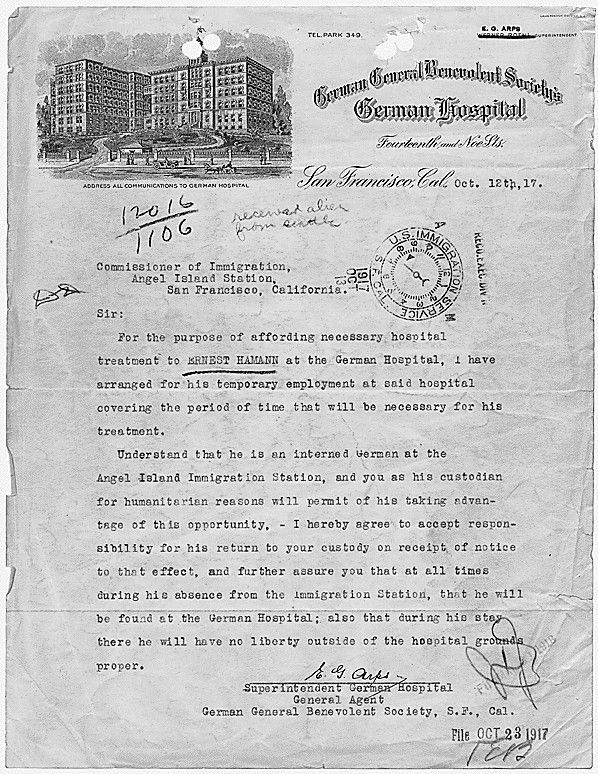How Have Americans Responded to Immigration?
Weighing the Evidence
All documents and text associated with this activity are printed below, followed by a worksheet for student responses.Introduction
You will see documents that may give you some indication of whether or not immigration was welcomed in the United States at different times. Be sure to click on the orange Details icon to explore the entire document. Pay attention to the dates to understand the time period covered.Analyze each document and move it to to the scale according to how strongly you think it supports one side or the other.
Name:
Class:
Class:
Worksheet
How Have Americans Responded to Immigration?
Weighing the Evidence
Examine the documents and text included in this activity. Consider how each document does or does not support two opposing interpretations or conclusions. Fill in the topic or interpretations if they are not provided. To show how the documents support the different interpretations, enter the corresponding document number into the boxes near the interpretation. Write your conclusion response in the space provided. Interpretation 1
America welcomes new immigrants and opens her doors to them.
America welcomes new immigrants and opens her doors to them.
How have Americans responded to immigration?
Interpretation 2
Americans are fearful or skeptical of new immigrants and have tried to exclude them.
Americans are fearful or skeptical of new immigrants and have tried to exclude them.
1
Activity Element
Secretary of the US Department of Homeland Security, Michael Chertoff, introduces President George W. Bush at the US Chamber of Commerce where President Bush gave a speech on Immigration
Page 1
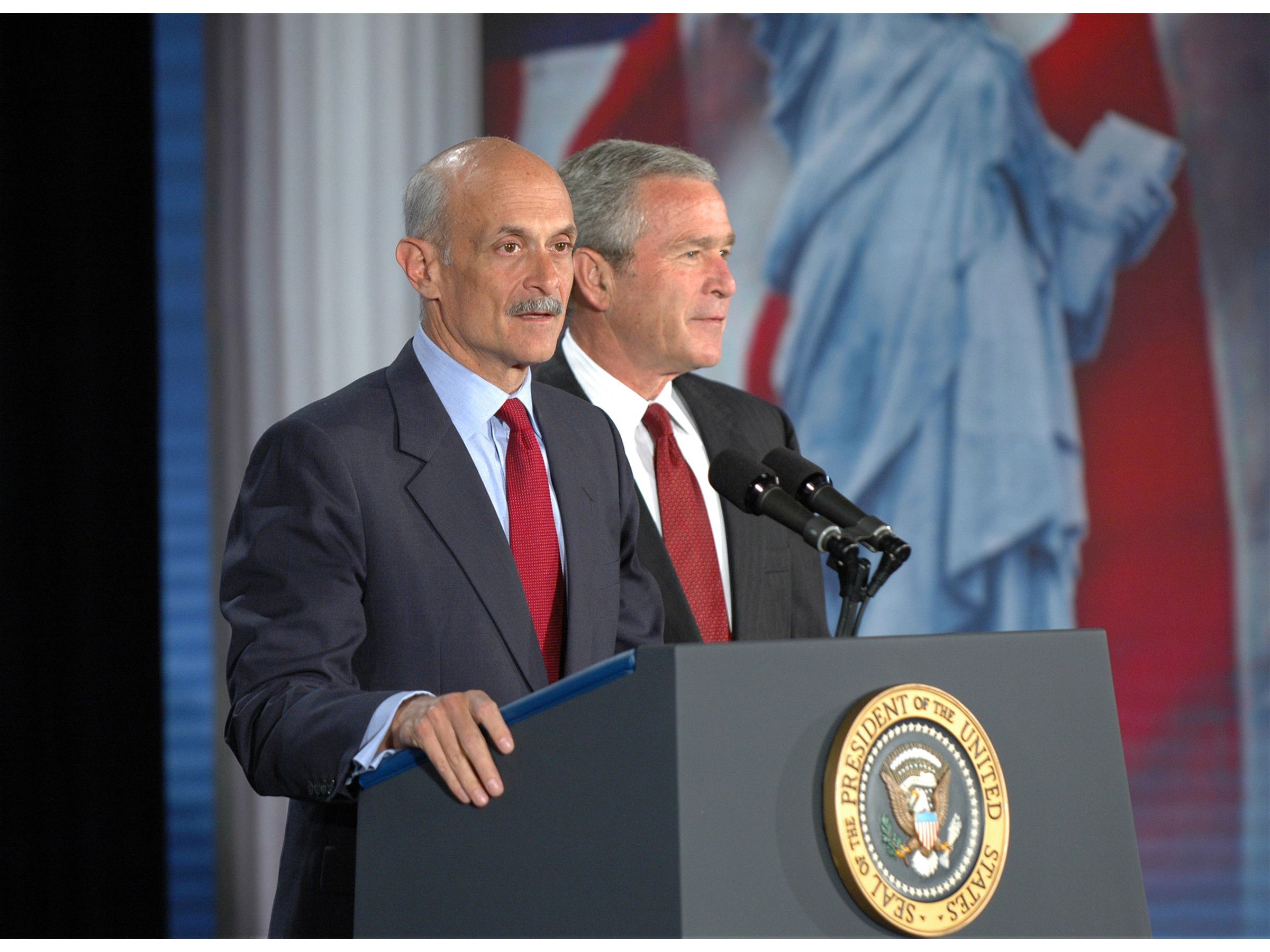
2
Activity Element
Photograph of President Lyndon B. Johnson Signing the Immigration Act
Page 1
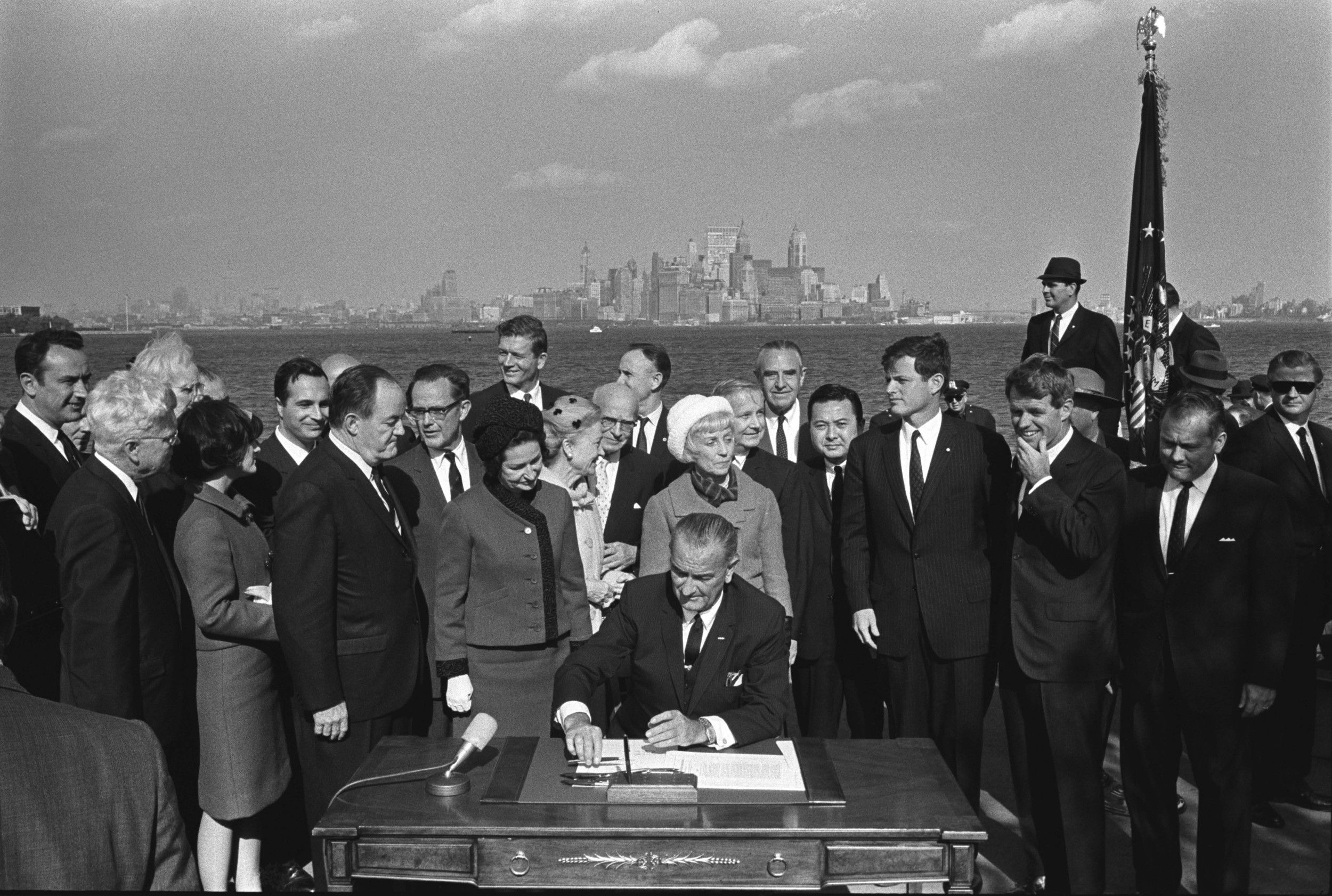
3
Activity Element
News from the U.S. Department of Labor, "Federal Stop-Order on Indio Farmer" (USDL-IX-59S56), San Francisco, August 3, 1959.
Page 1
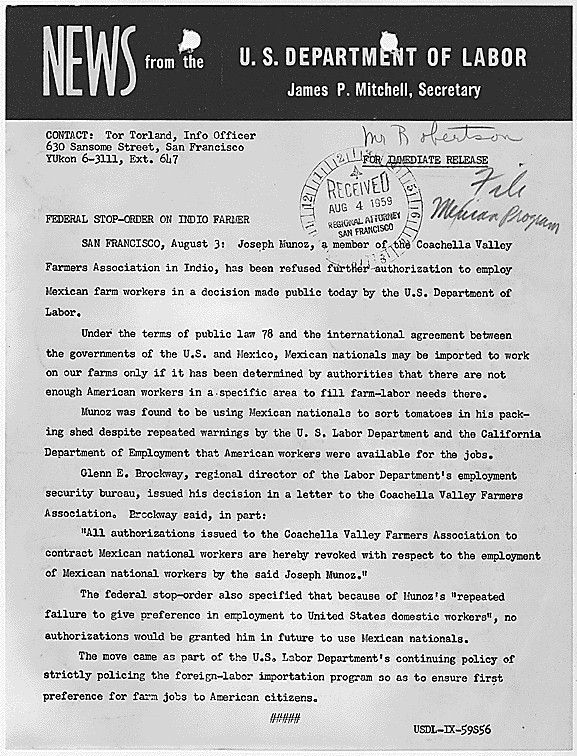
4
Activity Element
Memorandum from Harry S. Truman to the Secretary of State and Others
Page 1
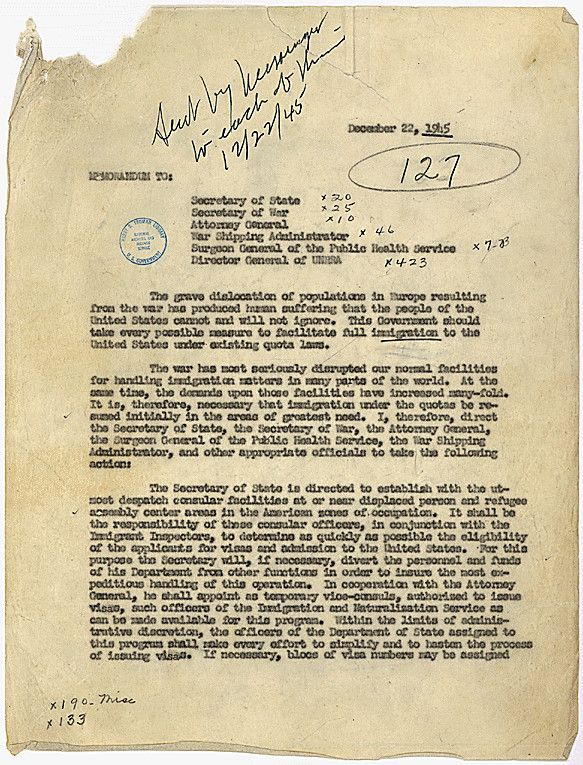
5
Activity Element
Act of December 17, 1943, Public Law 78-199, 57 STAT 600, to repeal the Chinese Exclusion Acts, and for other purposes
Page 1
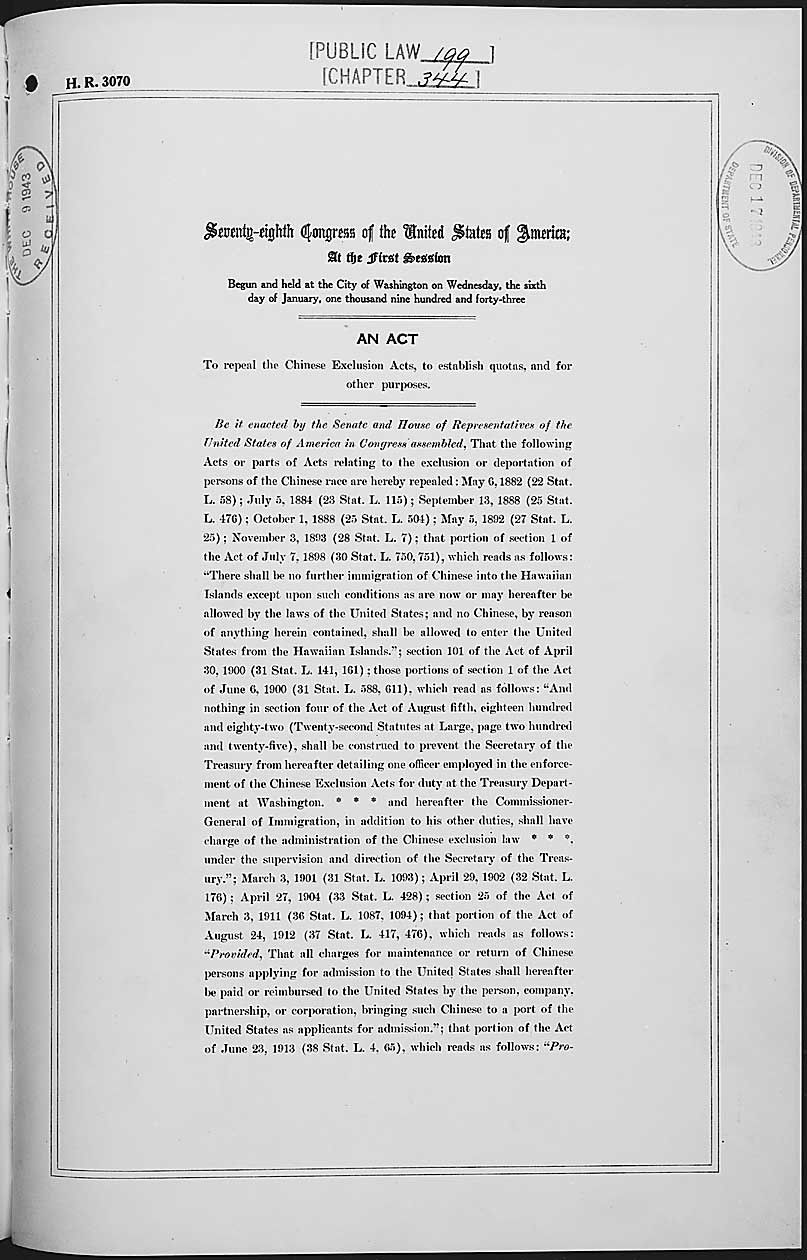
6
Activity Element
Oath of Allegiance of Mikael Amerikian
Page 1
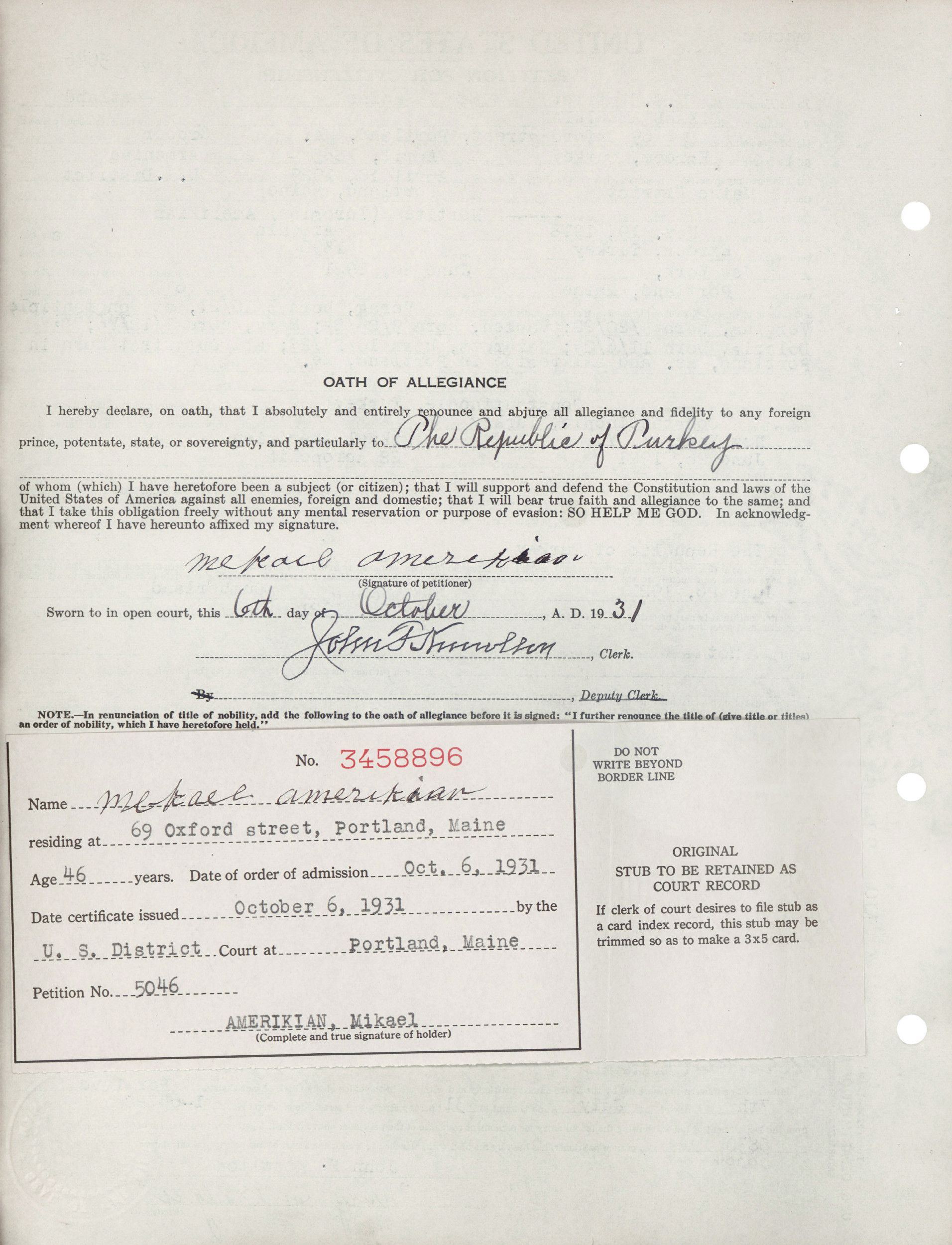
7
Activity Element
"Remember Your First Thrill of American Liberty. Your Duty- Buy United States Government Bonds. 2nd Liberty Loan of 1917."
Page 2
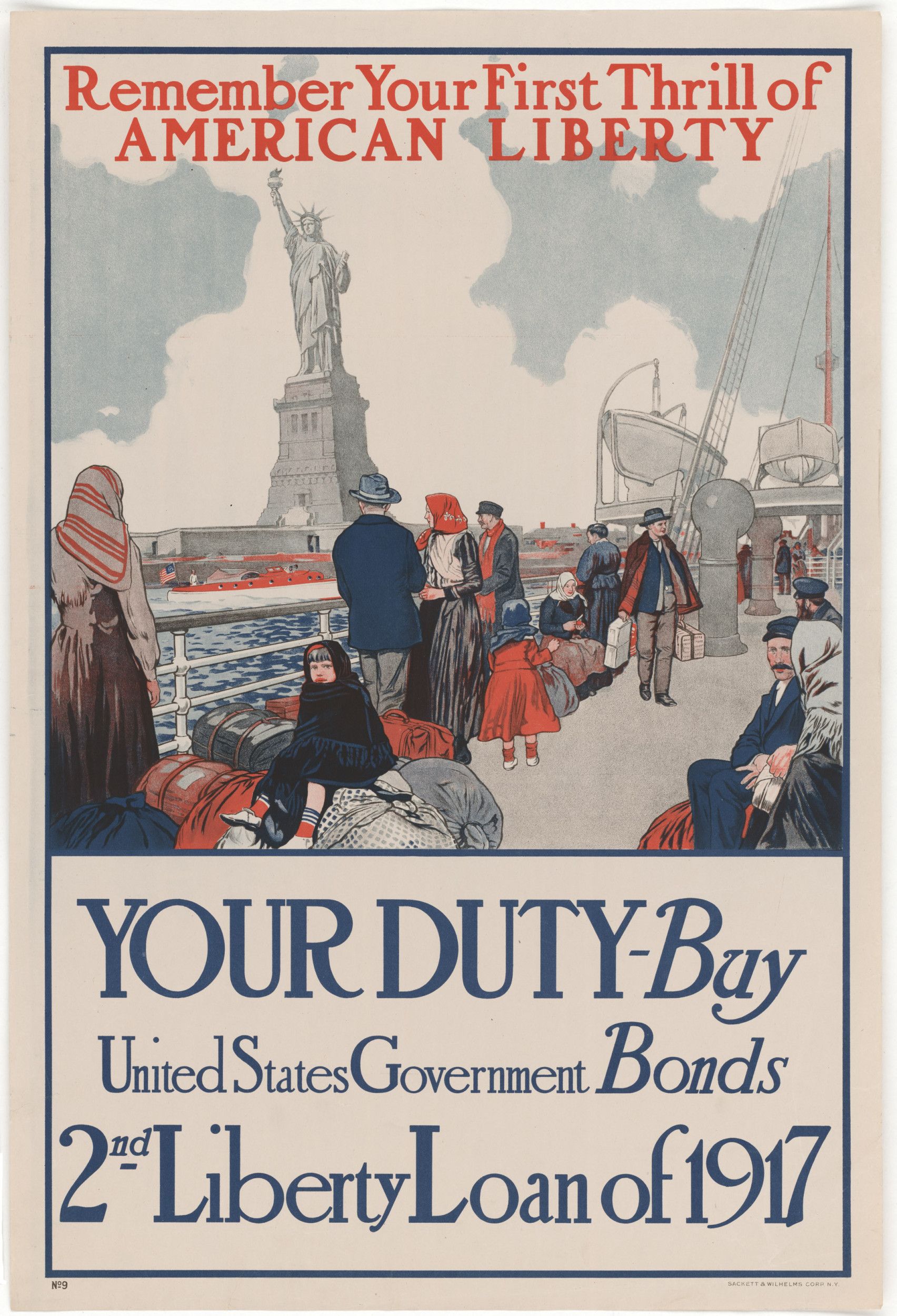
8
Activity Element
Interrogation of Lev Kotz, alias Lebe Nissinoff, "Russian Hebrew," by federal Immigration Board of Special Inquiry, Angel Island Immigration Station
Page 4
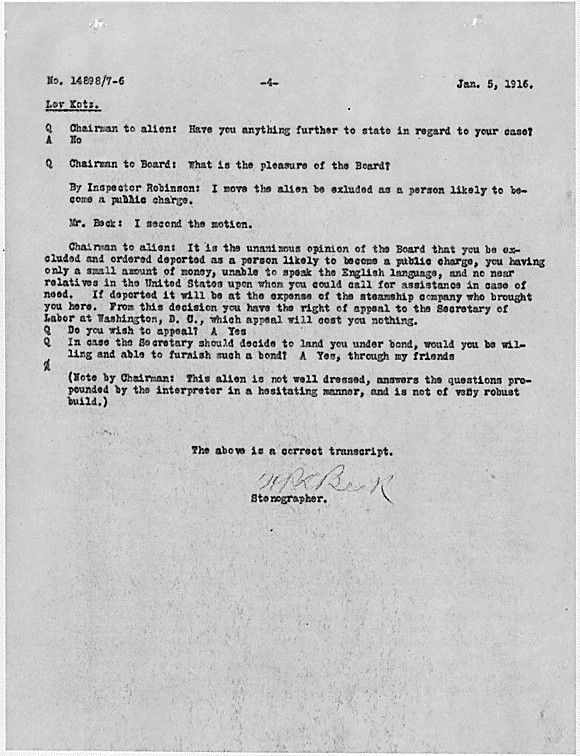
9
Activity Element
Photograph of Immigrants Landing at Ellis Island
Page 1
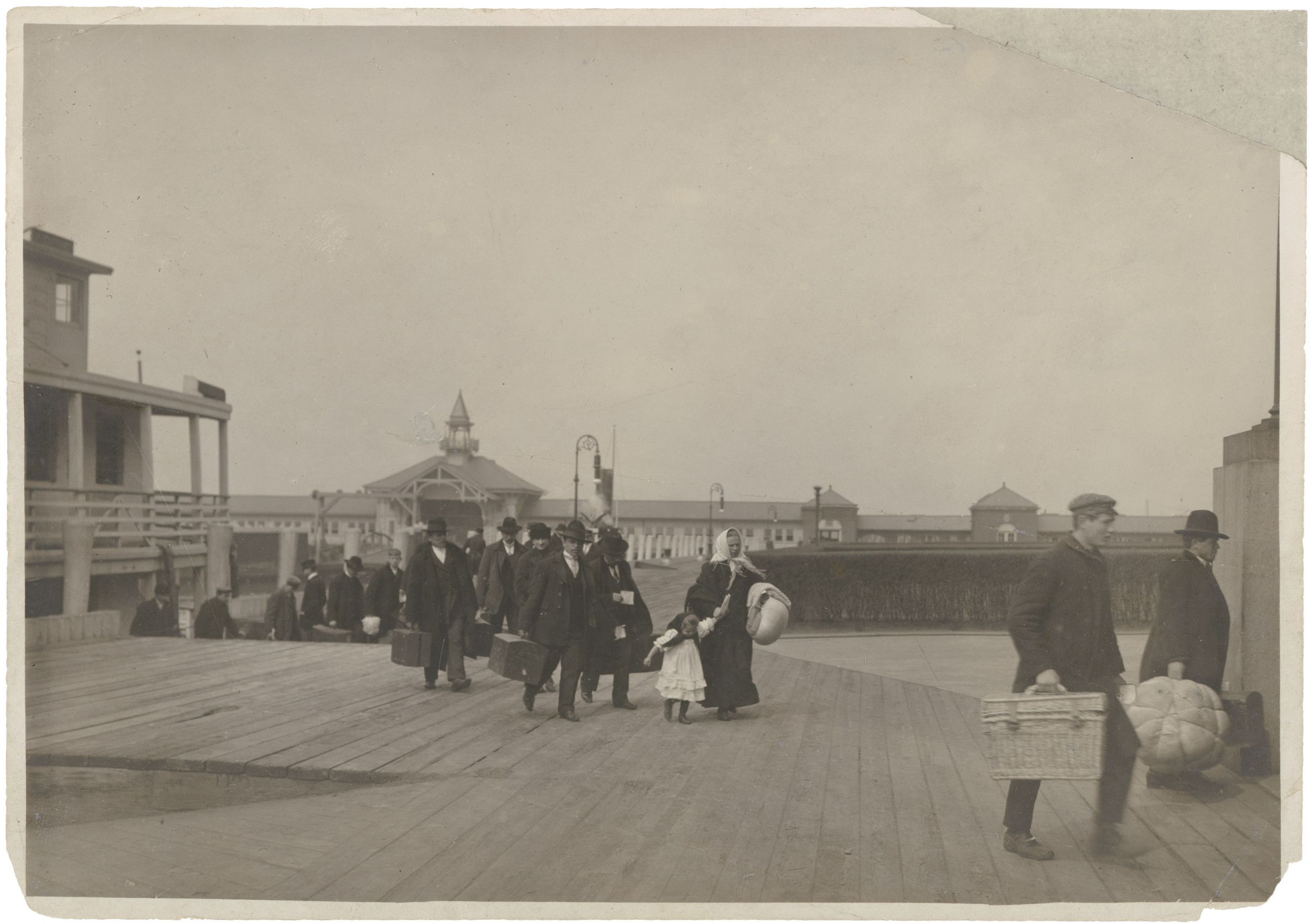
10
Activity Element
Photograph of Immigrants Arriving at the Immigration Station on Angel Island
Page 1
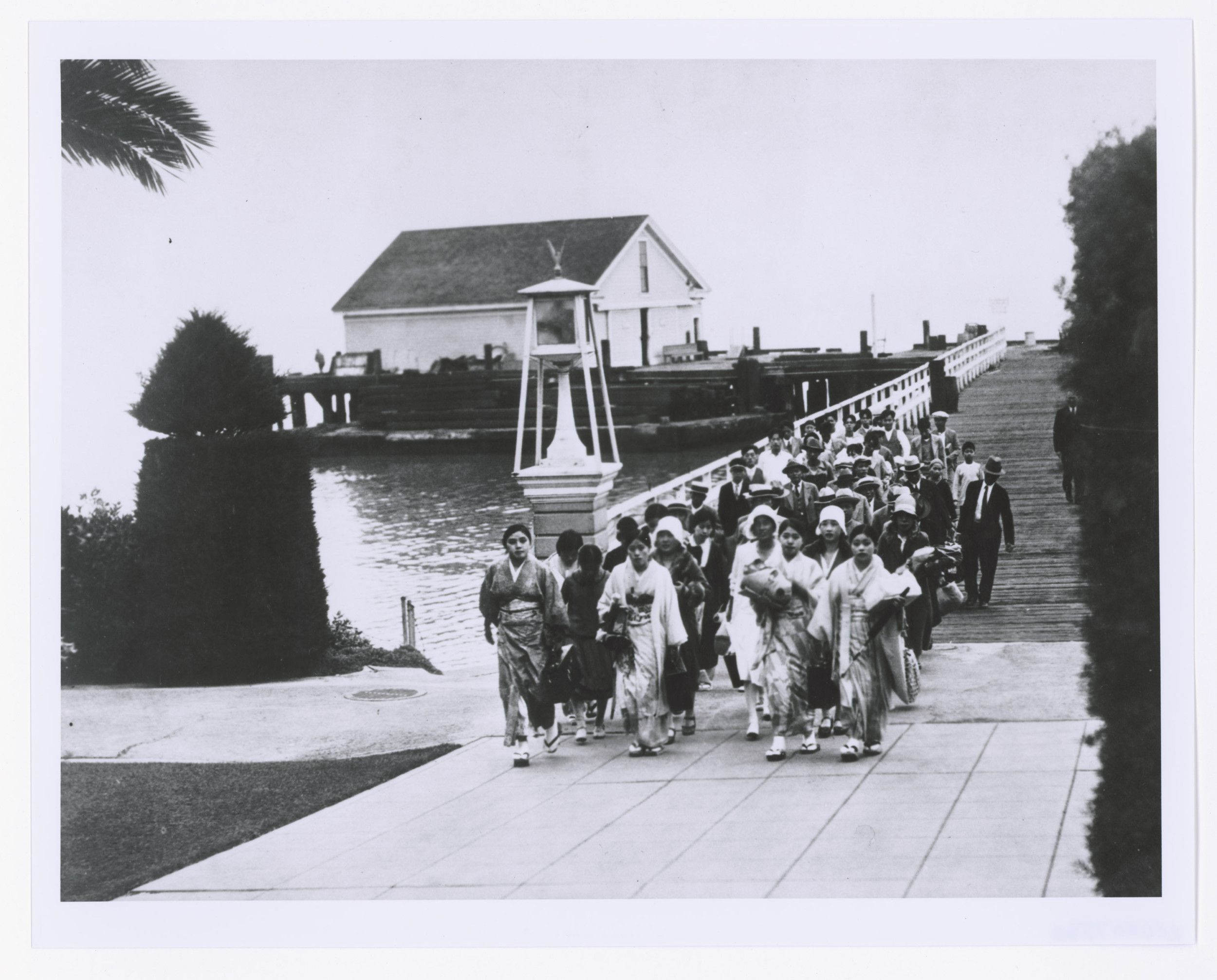
11
Activity Element
Manifest of Alien Immigrants for the SS Brasilia
Page 1
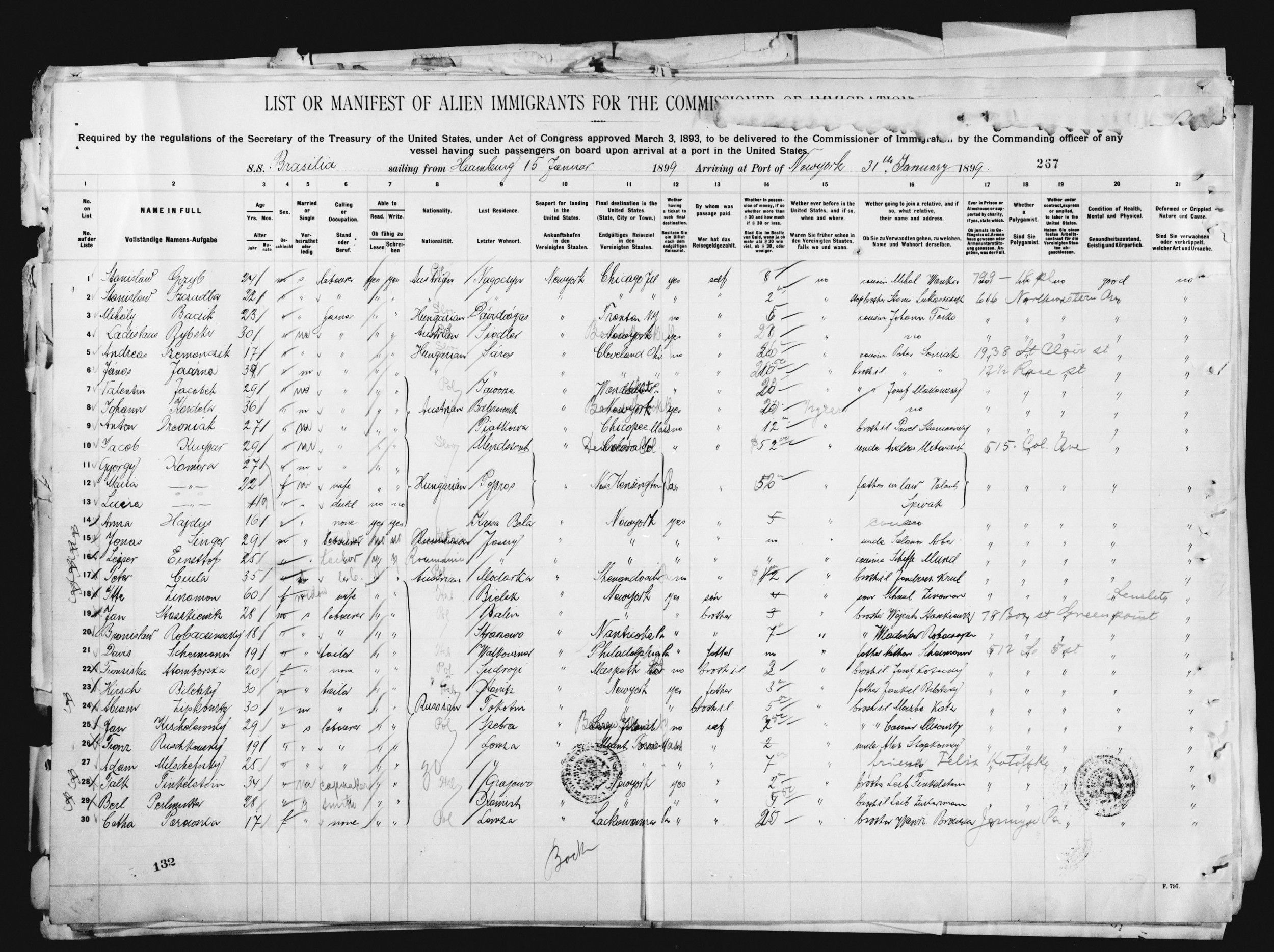
12
Activity Element
Flyers Distributed by Silver Bow Trades and Labor Assembly and Butte Miners` Union in Support of Chinese and Japanese Boycott
Page 1
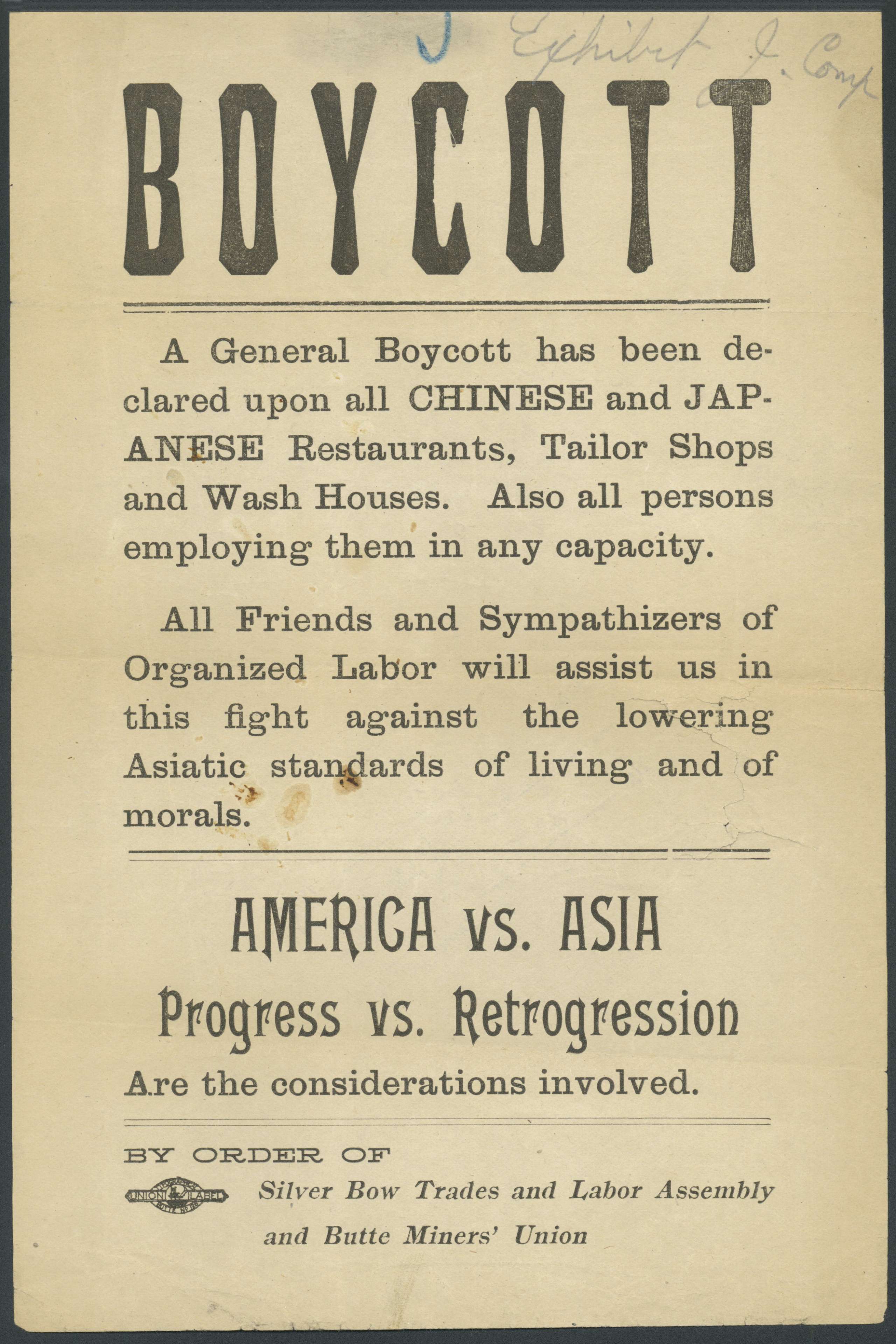
13
Activity Element
Alien and Sedition Acts of 1798
Page 1
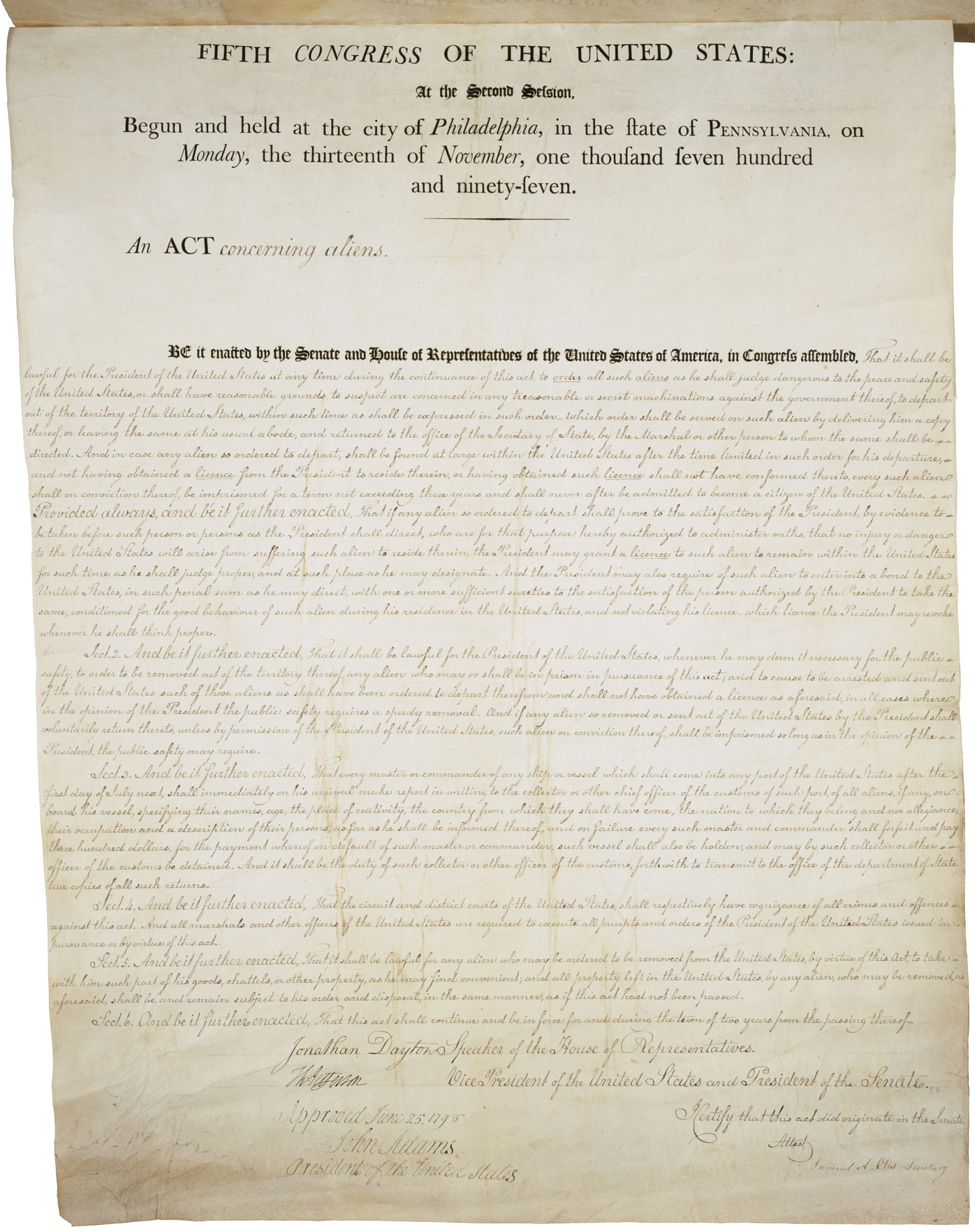
14
Activity Element
Texas of North America
Page 2
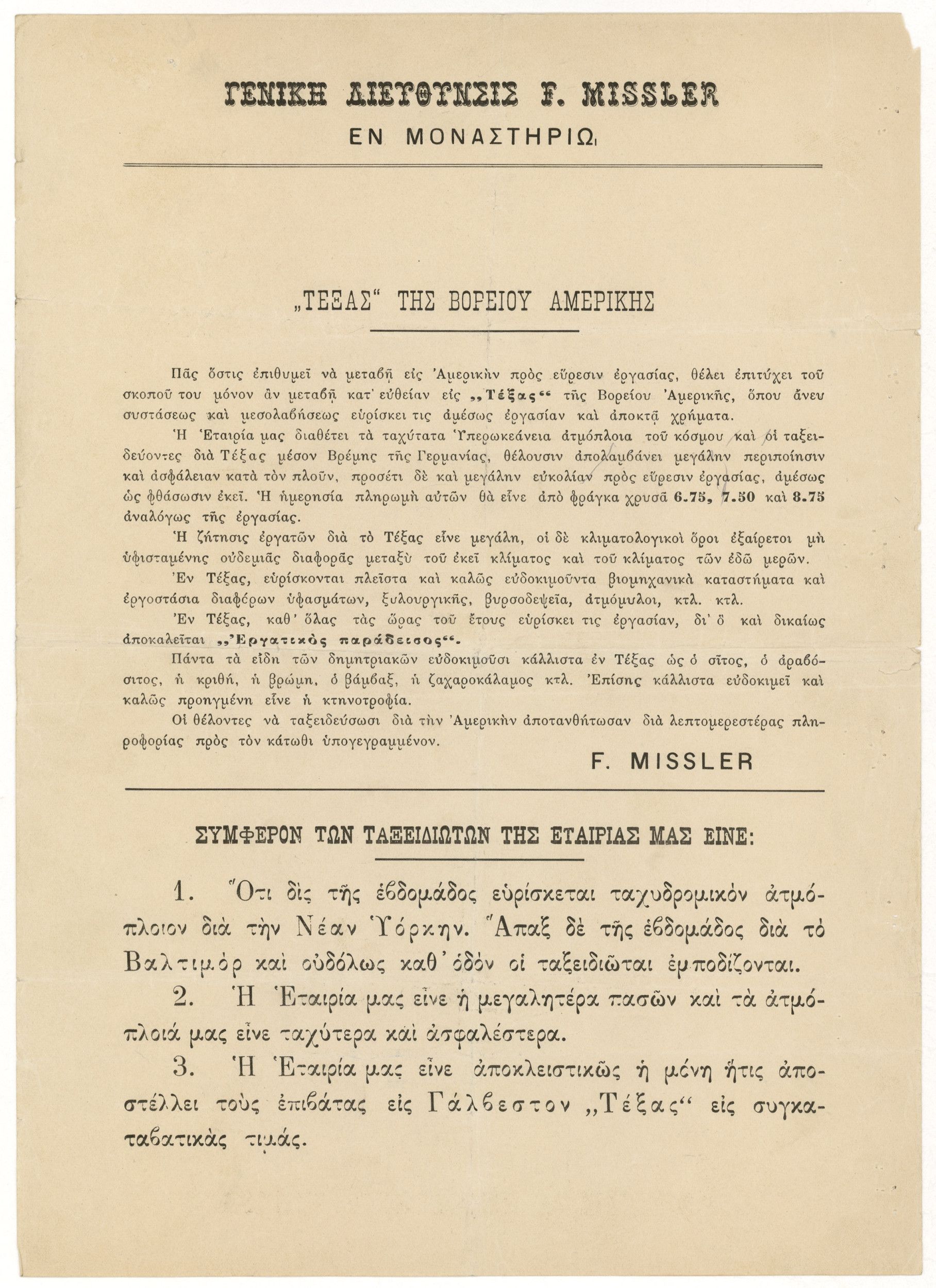
15
Activity Element
A Bill to Establish an Uniform Rule of Naturalization, and Enable Aliens to Hold Lands under Certain Conditions
Page 1
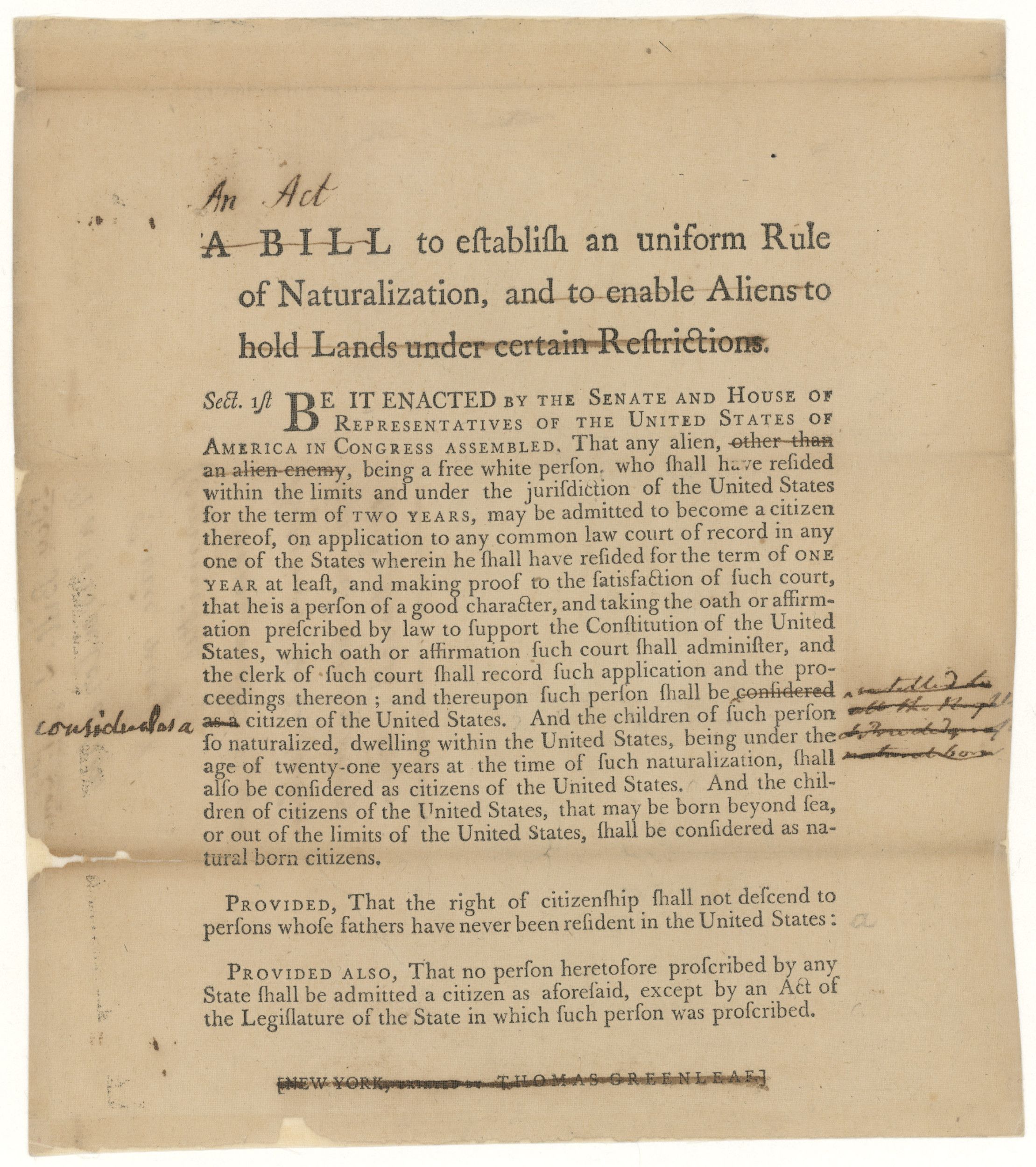
16
Activity Element
Incident Memorandum Regarding Cuban Refugees, Southern Florida
Page 1
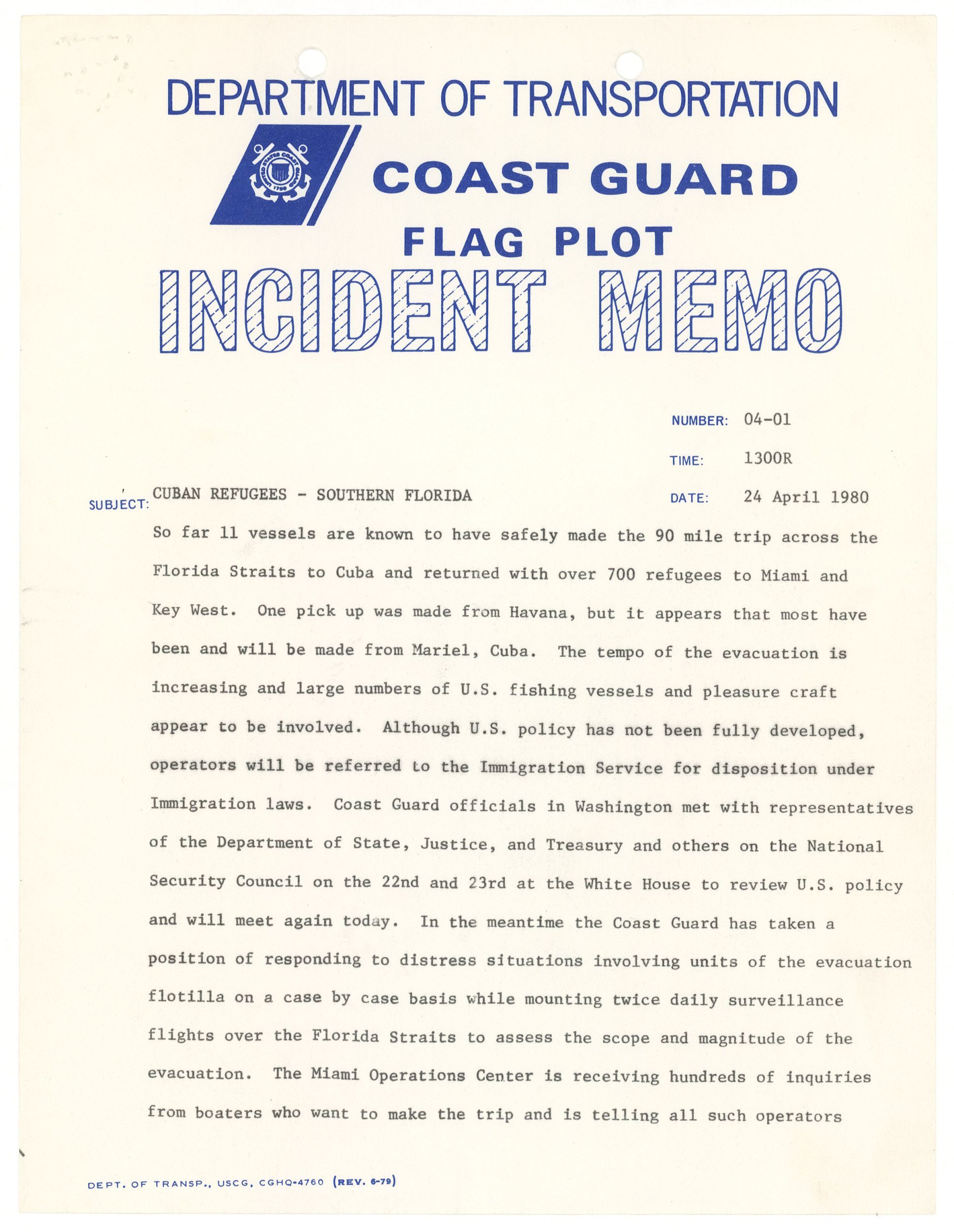
17
Activity Element
Foreign-Born Friends who are Applicants for American Citizenship
Page 1

18
Activity Element
Letter from German Hospital to Commissioner of Immigration, Angel Island Station, regarding enemy alien Ernst Hamann
Page 1
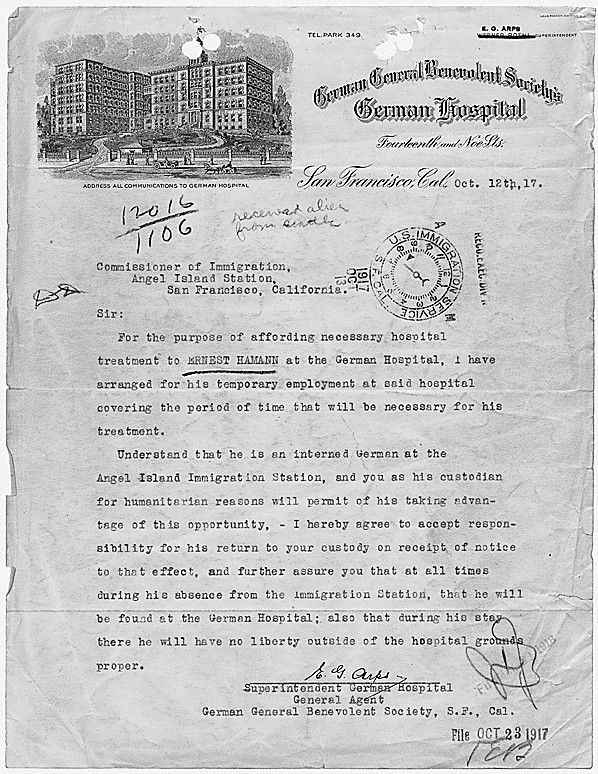
Conclusion
How Have Americans Responded to Immigration?
Weighing the Evidence
Thinking about the dates for the documents, what time period is covered?In a couple of sentences, explain one or two observations you made about how American attitudes toward immigration have changed over the years. Under what circumstances were immigrants more likely to be welcomed? More likely to be feared?
Respond in one sentence: You saw just a small selection of possible documents that could indicate how Americans responded to immigration at different times. What other kinds of documents would you look for if you were researching the history of American attitudes on this topic?
Your Response
Document
Secretary of the US Department of Homeland Security, Michael Chertoff, introduces President George W. Bush at the US Chamber of Commerce where President Bush gave a speech on Immigration
6/1/2006
This primary source comes from the Records of the Federal Emergency Management Agency.
National Archives Identifier: 5695337
Full Citation: Secretary of the US Department of Homeland Security, Michael Chertoff, introduces President George W. Bush at the US Chamber of Commerce where President Bush gave a speech on Immigration; 6/1/2006; Records of the Federal Emergency Management Agency, . [Online Version, https://docsteach.org/documents/document/secretary-of-the-us-department-of-homeland-security-michael-chertoff-introduces-president-george-w-bush-at-the-us-chamber-of-commerce-where-president-bush-gave-a-speech-on-immigration, April 20, 2024]Secretary of the US Department of Homeland Security, Michael Chertoff, introduces President George W. Bush at the US Chamber of Commerce where President Bush gave a speech on Immigration
Page 1
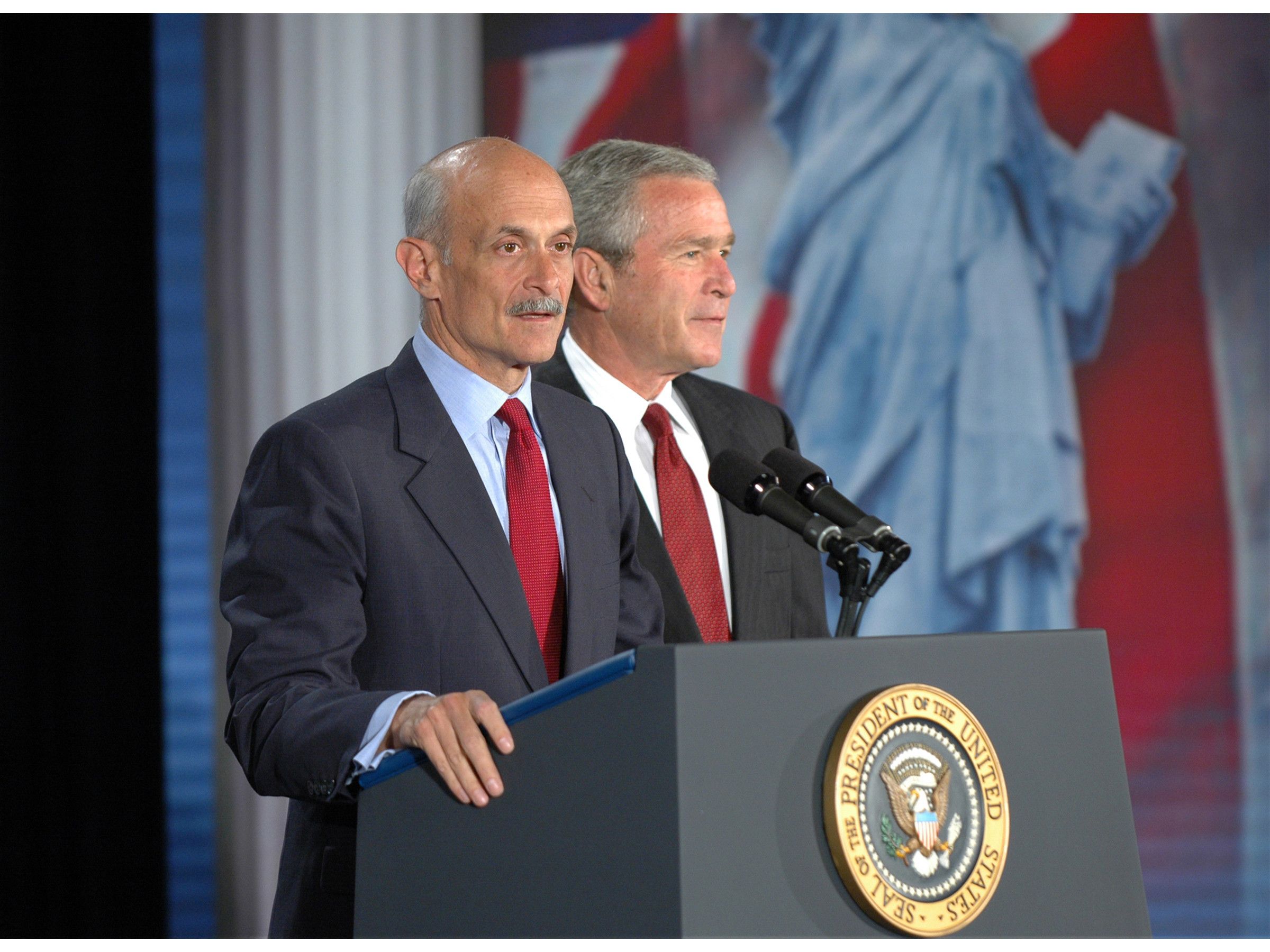
Document
Photograph of President Lyndon B. Johnson Signing the Immigration Act
10/3/1965
In this photograph, President Lyndon B. Johnson signs the Immigration and Nationality Act of 1965 at the Statue of Liberty. Vice President Hubert Humphrey, Lady Bird Johnson, Muriel Humphrey, Senator Edward (Ted) Kennedy, Senator Robert F. Kennedy, and others look on.
This law was an important milestone in American immigration history. It ended the "national origins formula" that had been in place since the 1920s. From 1924 until 1965, following passage of the National Origins Act of 1924, a person’s place of birth often determined his or her ability to immigrate legally into the United States. Numerical limits, often called quotas, were assigned to each country.
Immigration laws favored people from northern and western Europe over those from southern and eastern Europe, Asia, and Africa. For example, about 4,000 Italians were allowed to enter the United States annually, while about 66,000 could emigrate from Great Britain. Asian immigrants, who generally entered the United States through Angel Island, were already largely banned from U.S immigration by other laws passed in the late 19th and early 20th centuries.
Potential immigrants needed to apply for spots on the quota in their country of birth, regardless of where they and their family lived. Some quota waiting lists were a dozen years long, while others were not filled.
The Immigration Act of 1965 abolished this quota system and eliminated the formally racial character of immigration to the United States. Rather than discriminating on the basis of ethnicity or race, the law authorized 120,000 immigration visas for people from the western hemisphere and 170,000 visas for people from the eastern hemisphere. It also prioritized keeping families together, and put a preference on skilled workers.
On August 25, the 1965 Immigration and Nationality Act, also known as the Hart-Cellar Act, passed in the U.S. House of Representatives with a vote of 318-95. On September 22, the U.S. Senate passed it with a vote of 76-18. President Johnson signed it into law on October 3, 1965.
The original caption for this photograph reads: Outdoor photograph, sunny day. Wide view of large group of people. Hubert Humphrey and Mrs. Johnson are looking down at President Johnson picking up pen. Ted Kennedy is looking to right of frame, and Robert Kennedy has hand up to chin, smiling. New York City skyline is in background.
This law was an important milestone in American immigration history. It ended the "national origins formula" that had been in place since the 1920s. From 1924 until 1965, following passage of the National Origins Act of 1924, a person’s place of birth often determined his or her ability to immigrate legally into the United States. Numerical limits, often called quotas, were assigned to each country.
Immigration laws favored people from northern and western Europe over those from southern and eastern Europe, Asia, and Africa. For example, about 4,000 Italians were allowed to enter the United States annually, while about 66,000 could emigrate from Great Britain. Asian immigrants, who generally entered the United States through Angel Island, were already largely banned from U.S immigration by other laws passed in the late 19th and early 20th centuries.
Potential immigrants needed to apply for spots on the quota in their country of birth, regardless of where they and their family lived. Some quota waiting lists were a dozen years long, while others were not filled.
The Immigration Act of 1965 abolished this quota system and eliminated the formally racial character of immigration to the United States. Rather than discriminating on the basis of ethnicity or race, the law authorized 120,000 immigration visas for people from the western hemisphere and 170,000 visas for people from the eastern hemisphere. It also prioritized keeping families together, and put a preference on skilled workers.
On August 25, the 1965 Immigration and Nationality Act, also known as the Hart-Cellar Act, passed in the U.S. House of Representatives with a vote of 318-95. On September 22, the U.S. Senate passed it with a vote of 76-18. President Johnson signed it into law on October 3, 1965.
The original caption for this photograph reads: Outdoor photograph, sunny day. Wide view of large group of people. Hubert Humphrey and Mrs. Johnson are looking down at President Johnson picking up pen. Ted Kennedy is looking to right of frame, and Robert Kennedy has hand up to chin, smiling. New York City skyline is in background.
This primary source comes from the Collection LBJ-WHPO: White House Photo Office Collection.
National Archives Identifier: 2803428
Full Citation: Photograph A1421-33A; Photograph of President Lyndon B. Johnson Signing the Immigration Act; 10/3/1965; Johnson White House Photographs, 11/22/1963 - 1/20/1969; Collection LBJ-WHPO: White House Photo Office Collection, ; Lyndon Baines Johnson Library, Austin, TX. [Online Version, https://docsteach.org/documents/document/lbj-immigration-act, April 20, 2024]Photograph of President Lyndon B. Johnson Signing the Immigration Act
Page 1
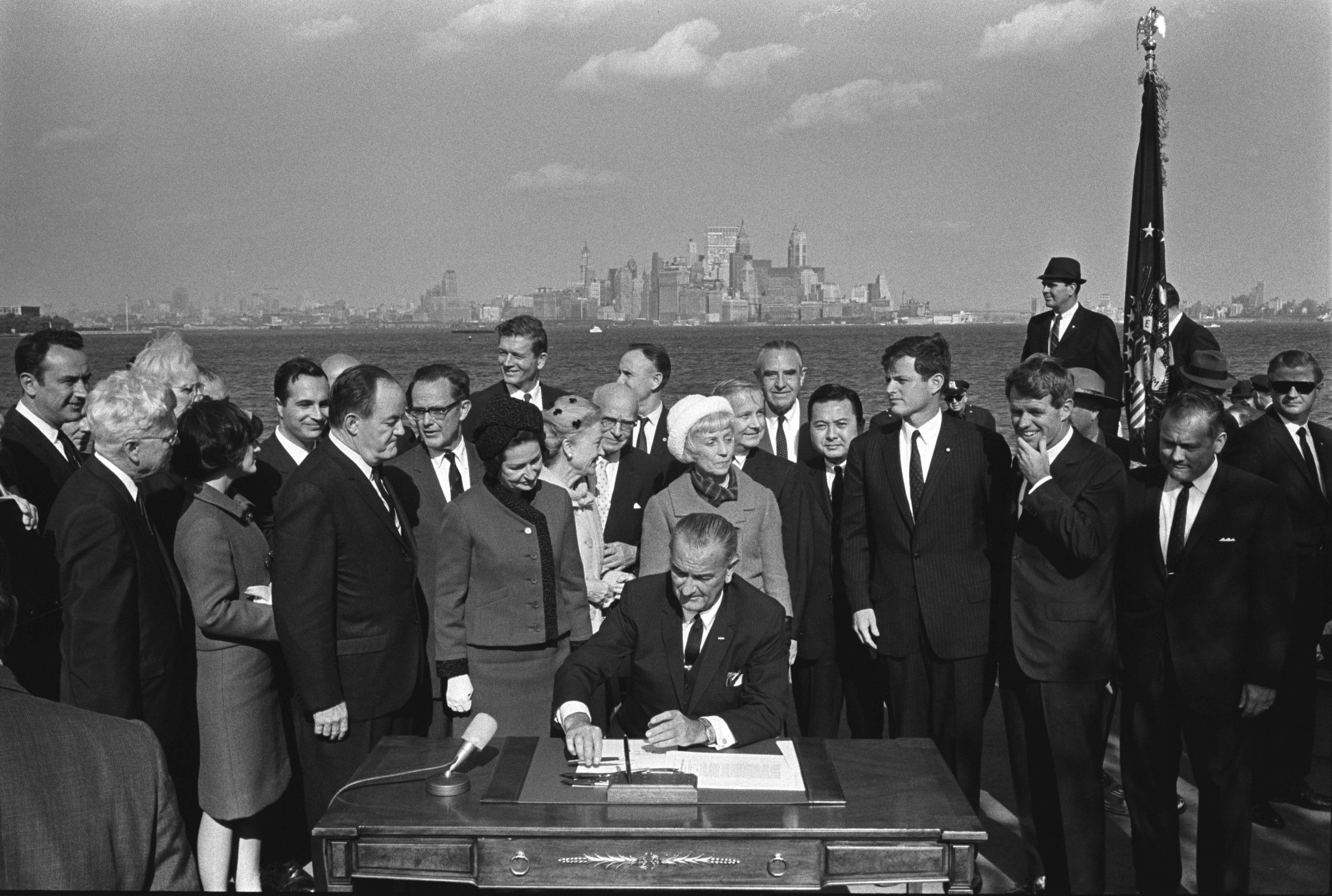
Document
News from the U.S. Department of Labor, 'Federal Stop-Order on Indio Farmer' (USDL-IX-59S56), San Francisco, August 3, 1959.
August 3, 1959
This primary source comes from the General Records of the Department of Labor.
National Archives Identifier: 296747
Full Citation: News from the U.S. Department of Labor, 'Federal Stop-Order on Indio Farmer' (USDL-IX-59S56), San Francisco, August 3, 1959.; August 3, 1959; General Records of the Department of Labor, . [Online Version, https://docsteach.org/documents/document/news-from-the-us-department-of-labor-federal-stoporder-on-indio-farmer-usdlix59s56-san-francisco-august-3-1959, April 20, 2024]News from the U.S. Department of Labor, 'Federal Stop-Order on Indio Farmer' (USDL-IX-59S56), San Francisco, August 3, 1959.
Page 1
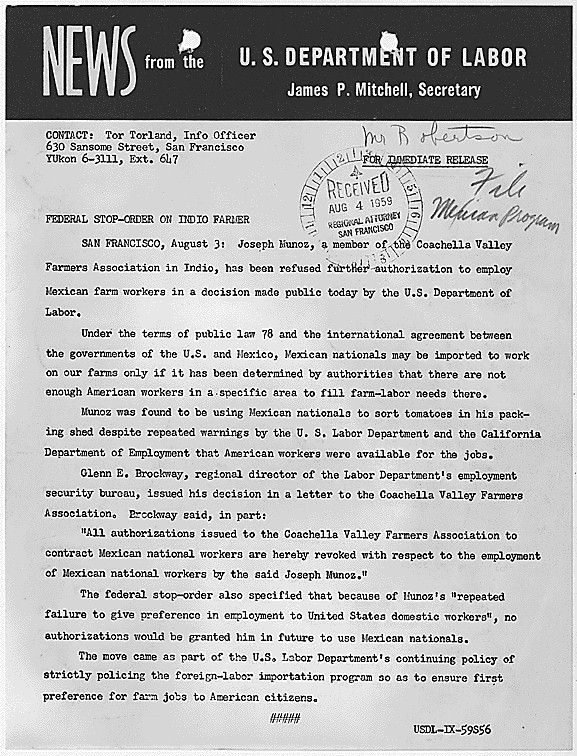
Document
Memorandum from Harry S. Truman to the Secretary of State and Others
12/22/1945
President Truman sent this memo to the Secretary of State, Secretary of War, Attorney General, War Shipping Administrator, Surgeon General of the Public Health Service, and Director General of the United Nations Relief and Rehabilitation Administration (UNRRA). In it he stated that the U.S. Government should accommodate the dislocation of populations in Europe resulting from World War II by taking "every possible measure to facilitate full immigration to the United states under existing quota laws."
This primary source comes from the Collection HST-OFF: Official Files (Truman Administration).
National Archives Identifier: 169048912
Full Citation: Memorandum from Harry S. Truman to the Secretary of State and Others; 12/22/1945; Political, Racial and Religious Refugees, 1945, OF 127; Official Files , 1945 - 1953; Collection HST-OFF: Official Files (Truman Administration), ; Harry S. Truman Library, Independence, MO. [Online Version, https://docsteach.org/documents/document/truman-secretary-of-state, April 20, 2024]Memorandum from Harry S. Truman to the Secretary of State and Others
Page 1
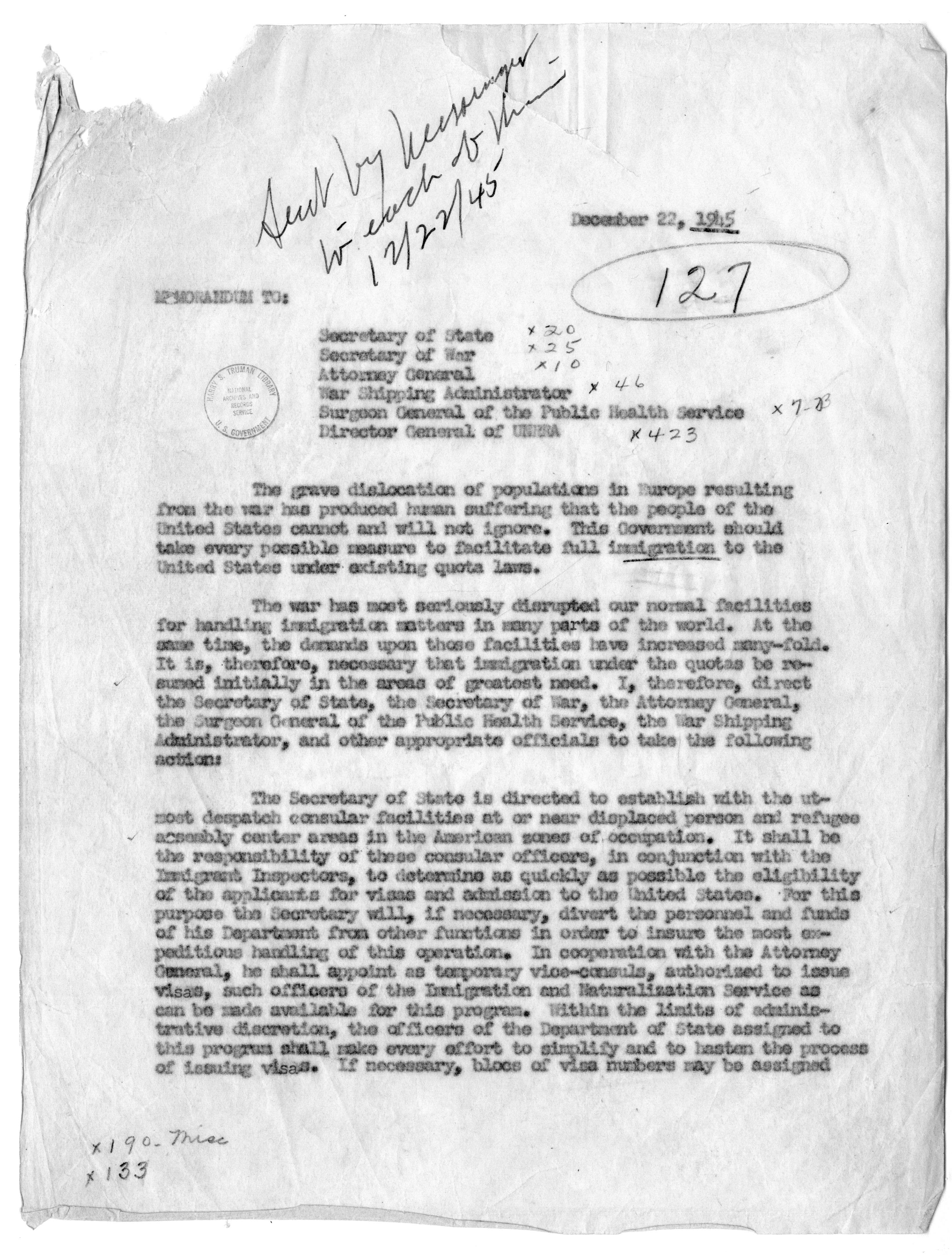
Memorandum from Harry S. Truman to the Secretary of State and Others
Page 2
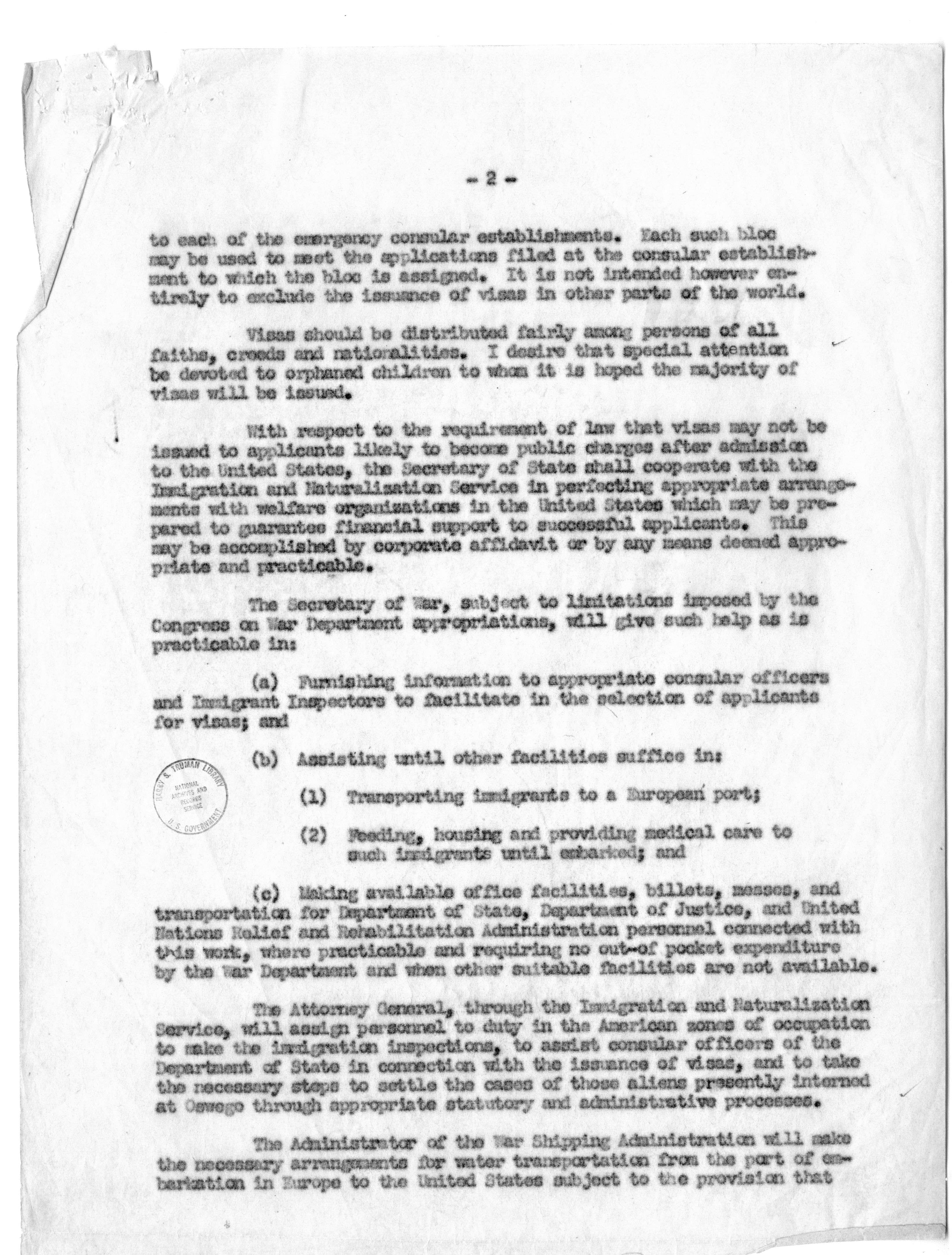
Memorandum from Harry S. Truman to the Secretary of State and Others
Page 3
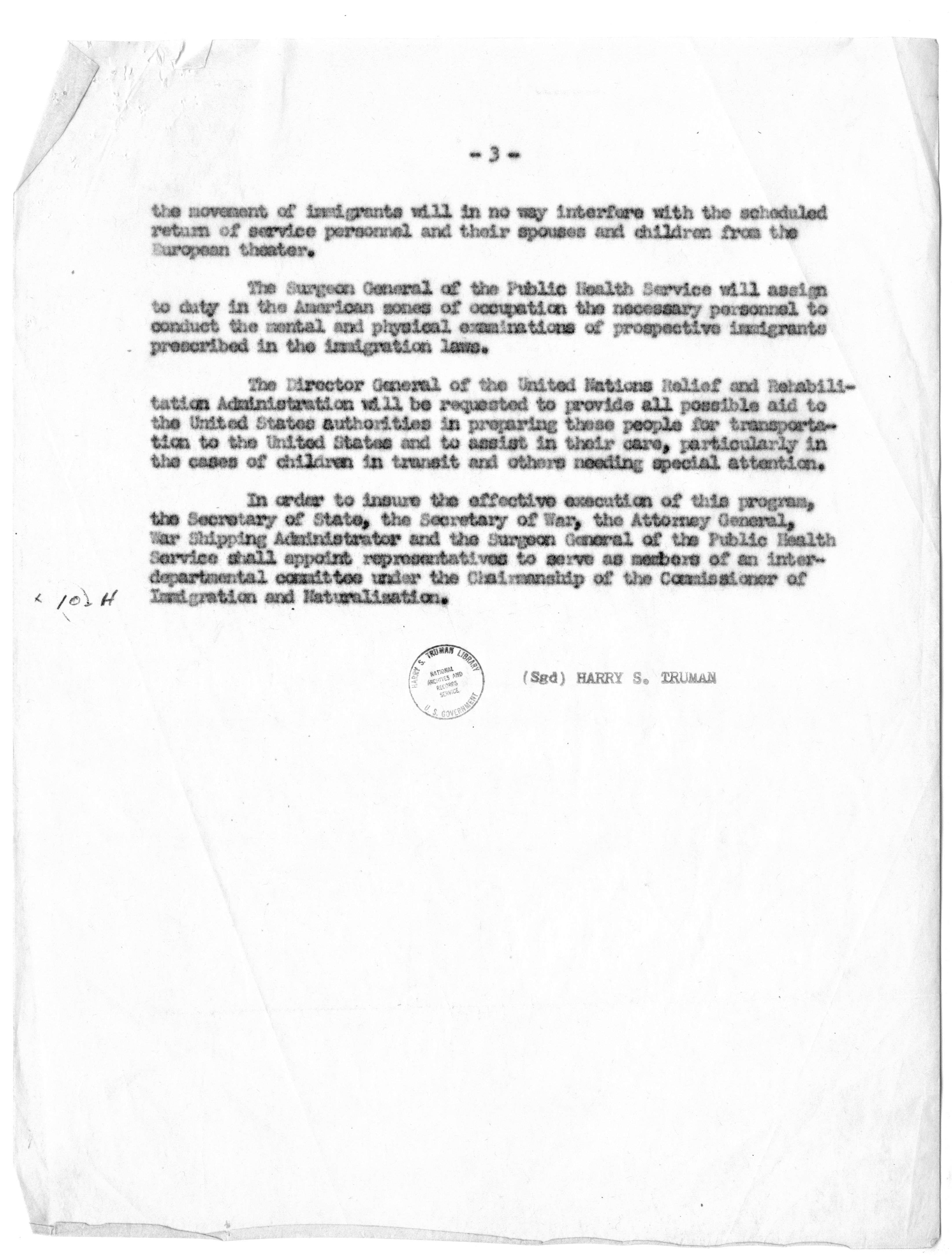
Document
Act of December 17, 1943, Public Law 78-199, 57 STAT 600, to repeal the Chinese Exclusion Acts, and for other purposes
12/17/1943
This primary source comes from the General Records of the United States Government.
National Archives Identifier: 299853
Full Citation: Act of December 17, 1943, Public Law 78-199, 57 STAT 600, to repeal the Chinese Exclusion Acts, and for other purposes; 12/17/1943; General Records of the United States Government, . [Online Version, https://docsteach.org/documents/document/act-of-december-17-1943-public-law-78199-57-stat-600-to-repeal-the-chinese-exclusion-acts-and-for-other-purposes, April 20, 2024]Act of December 17, 1943, Public Law 78-199, 57 STAT 600, to repeal the Chinese Exclusion Acts, and for other purposes
Page 1
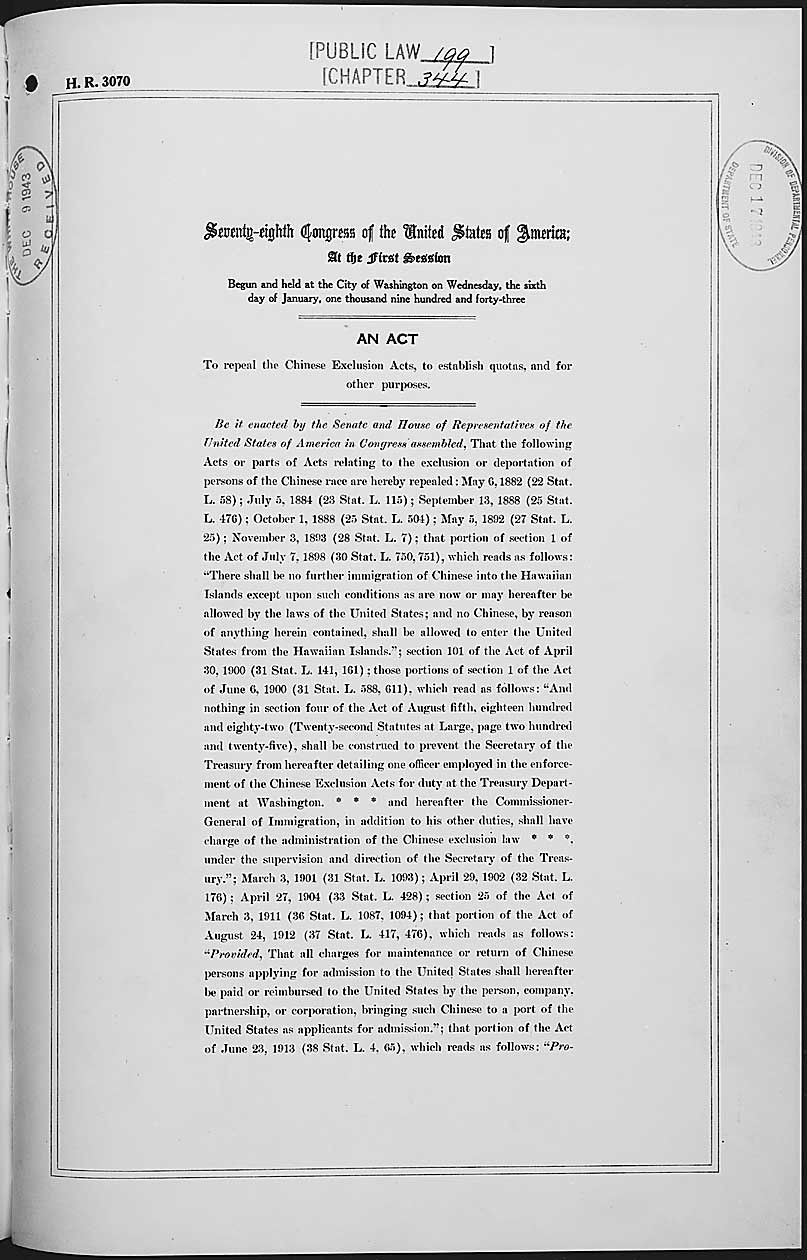
Act of December 17, 1943, Public Law 78-199, 57 STAT 600, to repeal the Chinese Exclusion Acts, and for other purposes
Page 2
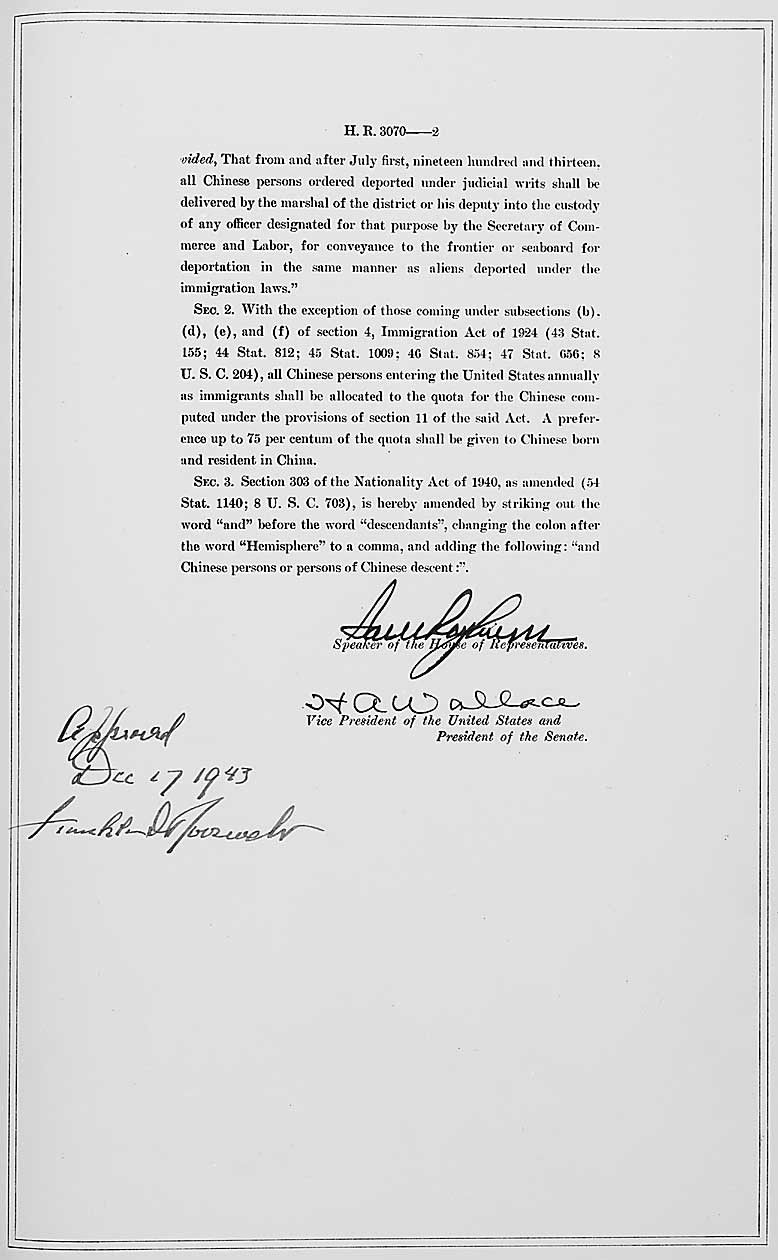
Document
Oath of Allegiance of Mikael Amerikian
10/6/1931
Mikael Amerikian swore an oath of allegiance to the United States and renounced his allegiance to the Republic of Turkey on October 6, 1931, in Portland, Maine. This oath was an important step on Amerikian’s path to citizenship.
This primary source comes from the Records of District Courts of the United States.
National Archives Identifier: 595054
Full Citation: Oath of Allegiance of Mikael Amerikian; 10/6/1931; Records of District Courts of the United States, . [Online Version, https://docsteach.org/documents/document/oath-of-allegiance-of-mikael-amerikian, April 20, 2024]Oath of Allegiance of Mikael Amerikian
Page 1
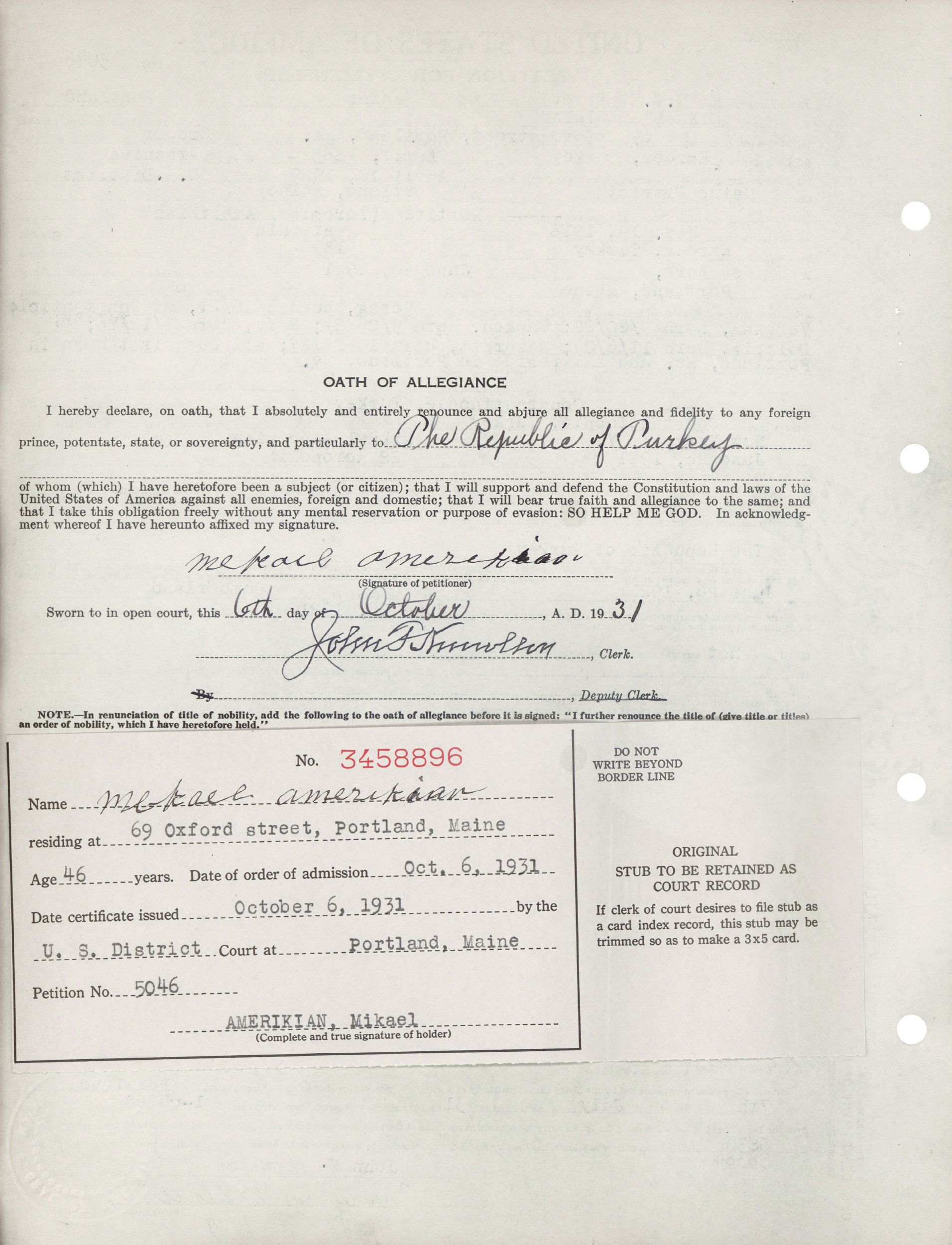
Document
'Remember Your First Thrill of American Liberty. Your Duty- Buy United States Government Bonds. 2nd Liberty Loan of 1917.'
1917
The United States Food Administration’s Education Division created this poster during the First World War to encourage newly arrived immigrants to support the Federal government by purchasing Liberty Bonds to fund the war. The second Liberty Loan of 1917 offered $3 billion in bonds with a return of four percent.
The poster reads: "Remember Your First Thrill of American Liberty. Your Duty- Buy United States Government Bonds. 2nd Liberty Loan of 1917."
The poster reads: "Remember Your First Thrill of American Liberty. Your Duty- Buy United States Government Bonds. 2nd Liberty Loan of 1917."
This primary source comes from the Records of the U.S. Food Administration.
National Archives Identifier: 512676
Full Citation: Poster 4-P-238; 'Remember Your First Thrill of American Liberty. Your Duty- Buy United States Government Bonds. 2nd Liberty Loan of 1917.'; 1917; World War I Posters, 1917 - 1919; Records of the U.S. Food Administration, ; National Archives at College Park, College Park, MD. [Online Version, https://docsteach.org/documents/document/first-thrill-liberty, April 20, 2024]'Remember Your First Thrill of American Liberty. Your Duty- Buy United States Government Bonds. 2nd Liberty Loan of 1917.'
Page 2
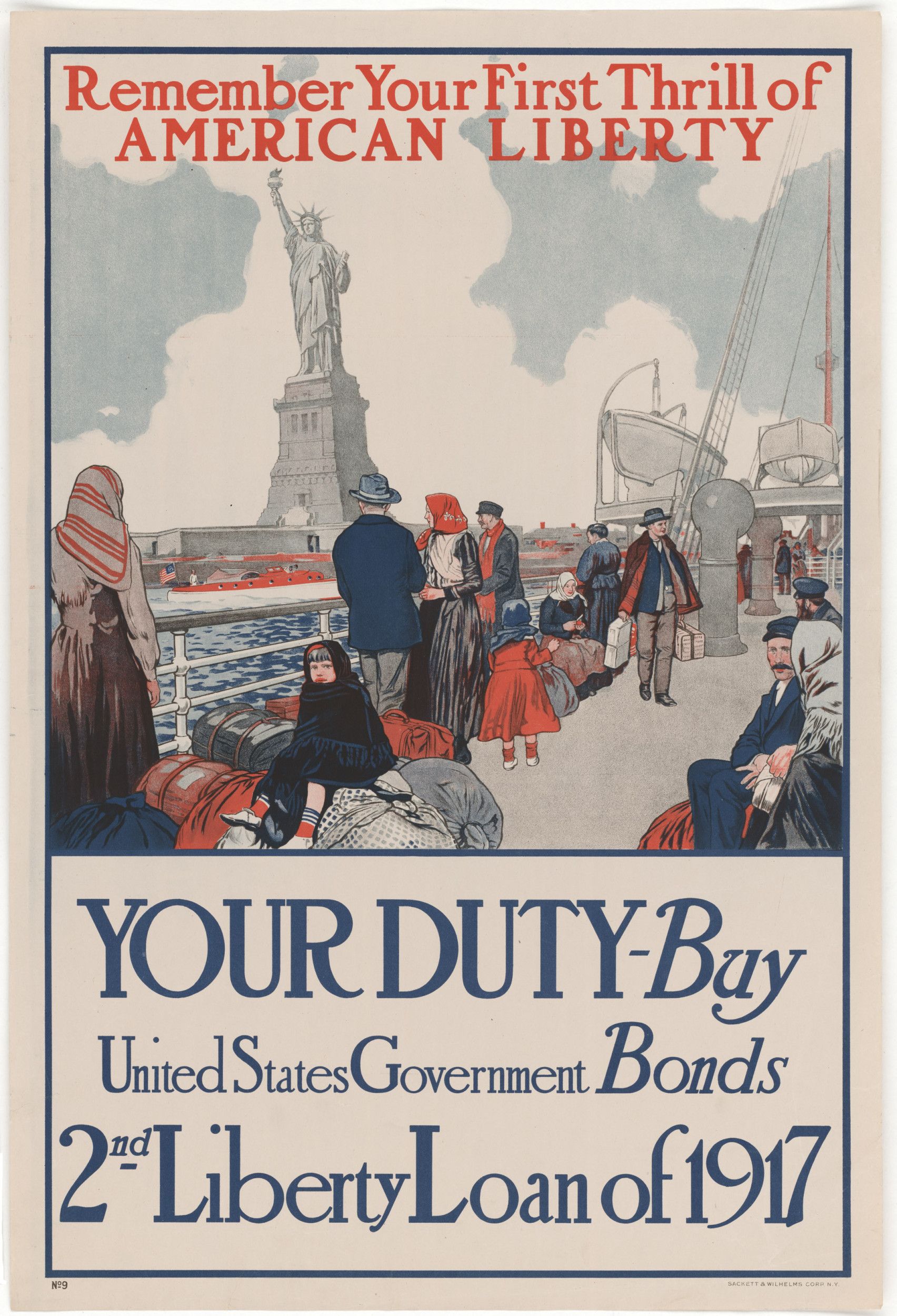
Document
Interrogation of Lev Kotz, alias Lebe Nissinoff, 'Russian Hebrew,' by federal Immigration Board of Special Inquiry, Angel Island Immigration Station
1/4/1916 - 1/5/1916
This primary source comes from the Records of the Immigration and Naturalization Service.
National Archives Identifier: 296475
Full Citation: Interrogation of Lev Kotz, alias Lebe Nissinoff, 'Russian Hebrew,' by federal Immigration Board of Special Inquiry, Angel Island Immigration Station; 1/4/1916 - 1/5/1916; Records of the Immigration and Naturalization Service, . [Online Version, https://docsteach.org/documents/document/interrogation-of-lev-kotz-alias-lebe-nissinoff-russian-hebrew-by-federal-immigration-board-of-special-inquiry-angel-island-immigration-station, April 20, 2024]Interrogation of Lev Kotz, alias Lebe Nissinoff, 'Russian Hebrew,' by federal Immigration Board of Special Inquiry, Angel Island Immigration Station
Page 1
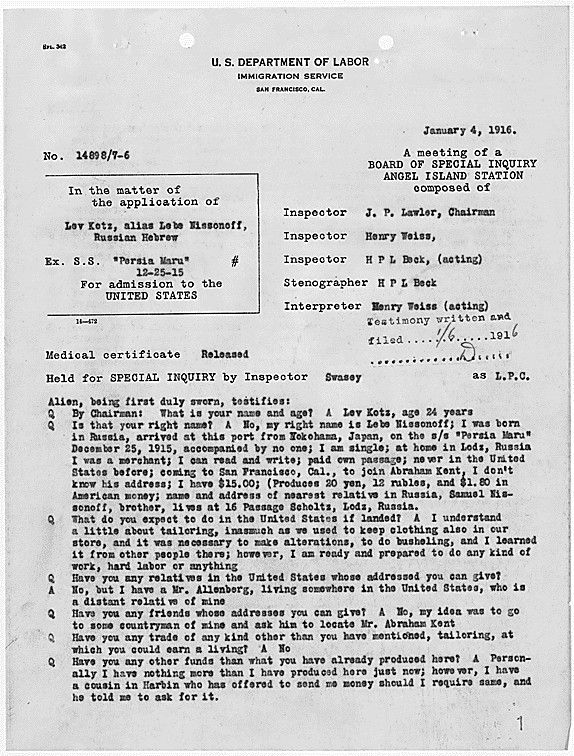
Interrogation of Lev Kotz, alias Lebe Nissinoff, 'Russian Hebrew,' by federal Immigration Board of Special Inquiry, Angel Island Immigration Station
Page 2
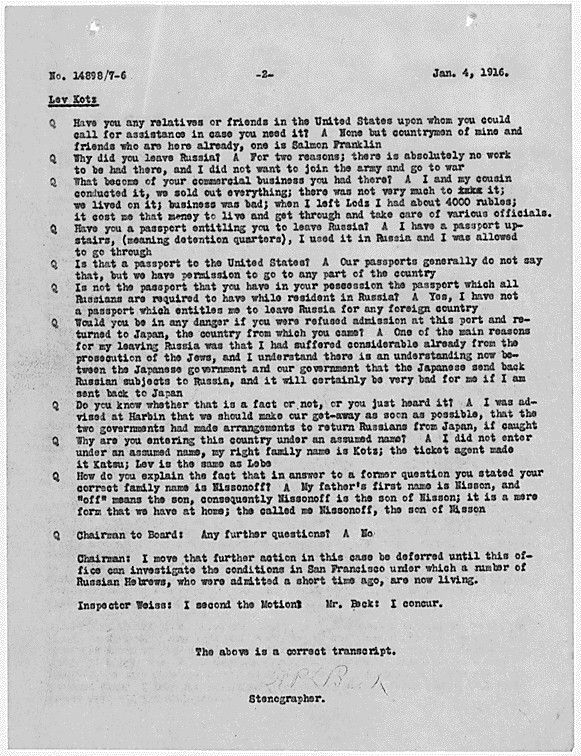
Interrogation of Lev Kotz, alias Lebe Nissinoff, 'Russian Hebrew,' by federal Immigration Board of Special Inquiry, Angel Island Immigration Station
Page 3
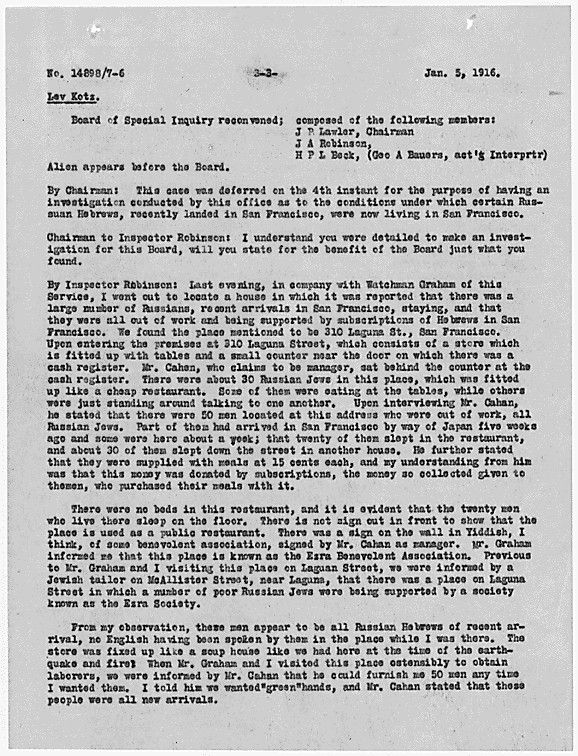
Interrogation of Lev Kotz, alias Lebe Nissinoff, 'Russian Hebrew,' by federal Immigration Board of Special Inquiry, Angel Island Immigration Station
Page 4
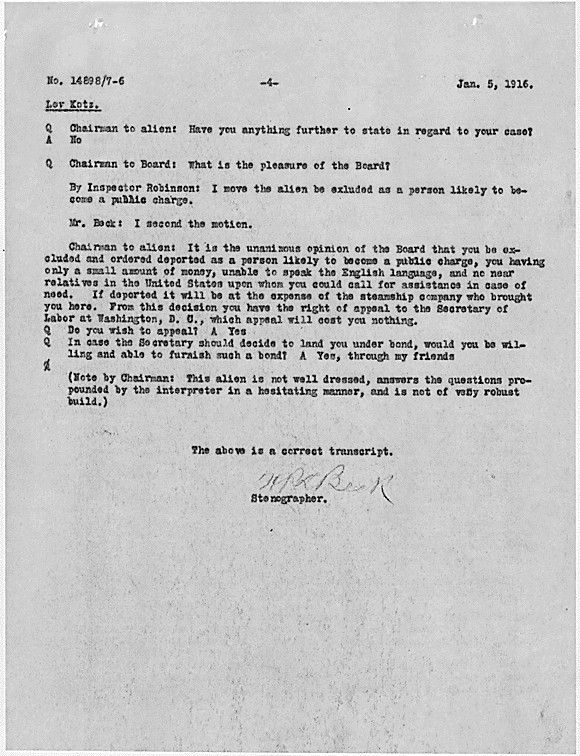
Document
Photograph of Immigrants Landing at Ellis Island
ca. 1900
After long and uncomfortable voyages, immigrants of all ages and nationalities poured through Ellis Island, the immigration processing center at the Port of New York. Between 1892 and 1924, an estimated 20 million individuals began their lives in America here
This primary source comes from the Records of the Public Health Service.
National Archives Identifier: 595034
Full Citation: Photograph of Immigrants Landing at Ellis Island; ca. 1900; Records of the Public Health Service, . [Online Version, https://docsteach.org/documents/document/photograph-of-immigrants-landing-at-ellis-island, April 20, 2024]Photograph of Immigrants Landing at Ellis Island
Page 1
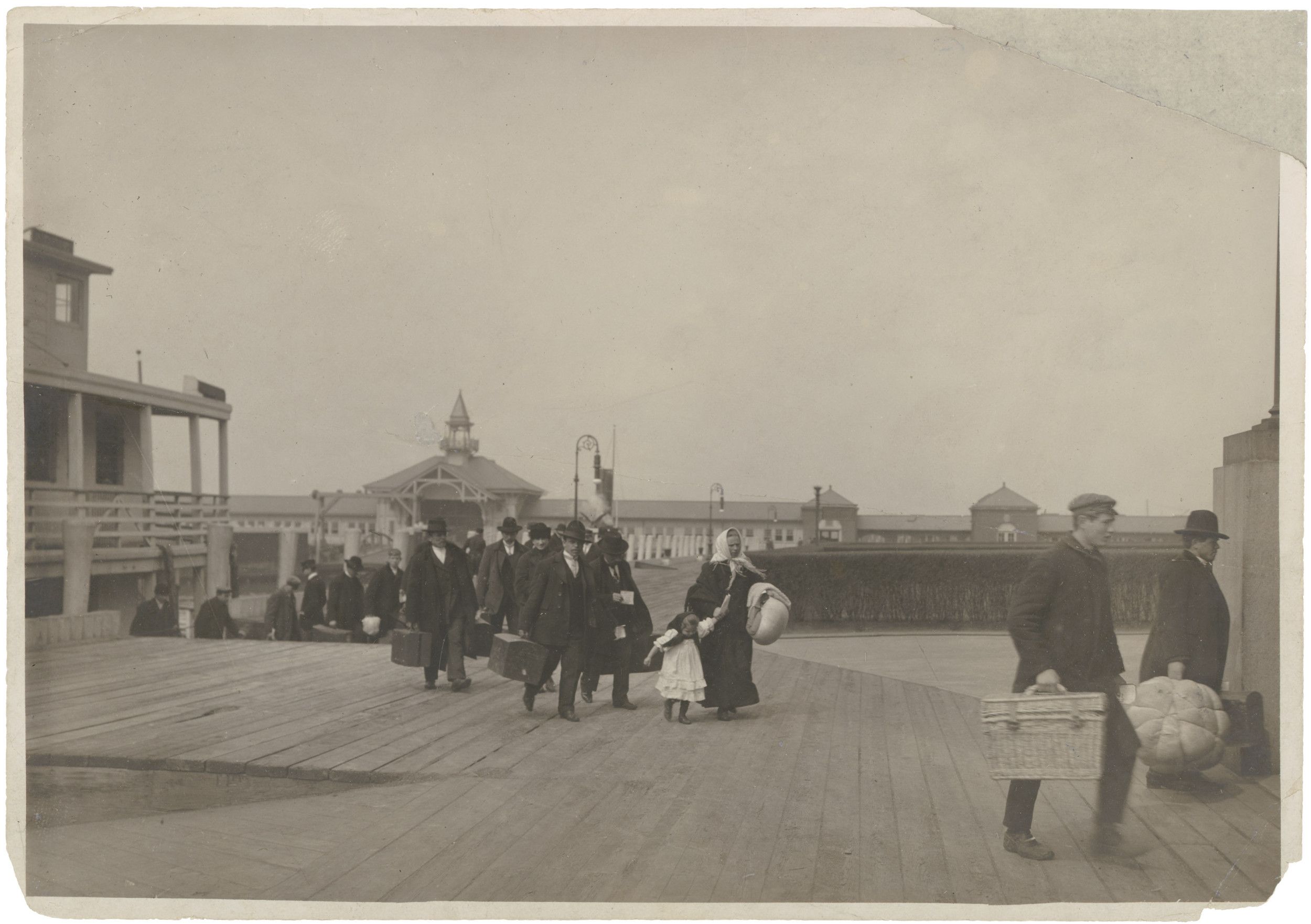
Document
Immigrants Arriving at the Immigration Station on Angel Island
ca. 1931
This undated photograph captures just a few of the millions of Asian immigrants to pass through Angel Island, in California’s San Francisco Bay. Now a National Historic Landmark and State Park, Angel Island served as a U.S. Immigration Station from 1910 until 1941. Although immigrants were usually detained here for a week or two in a housing compound for processing, some spent as long as two years for health reasons.
This primary source comes from the Records of the Public Health Service.
National Archives Identifier: 595673
Full Citation: Photograph 90-G-152-2038; Immigrants Arriving at the Immigration Station on Angel Island; ca. 1931; Public Health Service Historical Photograph File, 1880 - 1943; Records of the Public Health Service, ; National Archives at College Park, College Park, MD. [Online Version, https://docsteach.org/documents/document/arriving-angel-island, April 20, 2024]Immigrants Arriving at the Immigration Station on Angel Island
Page 1
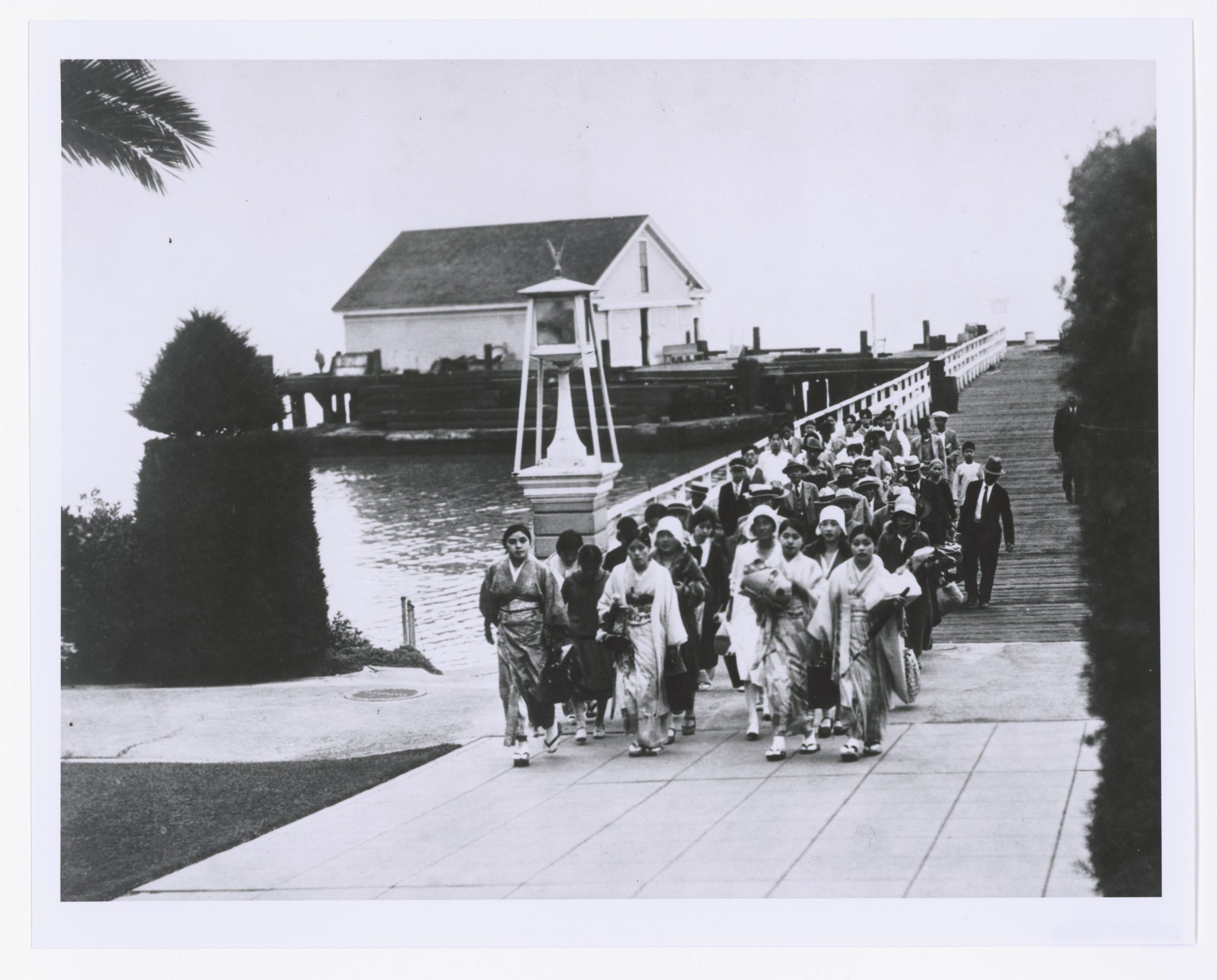
Document
Manifest of Alien Immigrants for the SS Brasilia
1/31/1899
This manifest contains the names of immigrants who arrived on the S.S. Brasilia from Hamburg, Germany, on January 31, 1899. In addition to standard information such as name and age, this 19th-century form requests that each respondent identify who paid for his passage on the ship and whether or not he is a polygamist.
This primary source comes from the Records of the Immigration and Naturalization Service.
National Archives Identifier: 596307
Full Citation: Manifest of Alien Immigrants for the SS Brasilia; 1/31/1899; Records of the Immigration and Naturalization Service, . [Online Version, https://docsteach.org/documents/document/manifest-of-alien-immigrants-for-the-ss-brasilia, April 20, 2024]Manifest of Alien Immigrants for the SS Brasilia
Page 1
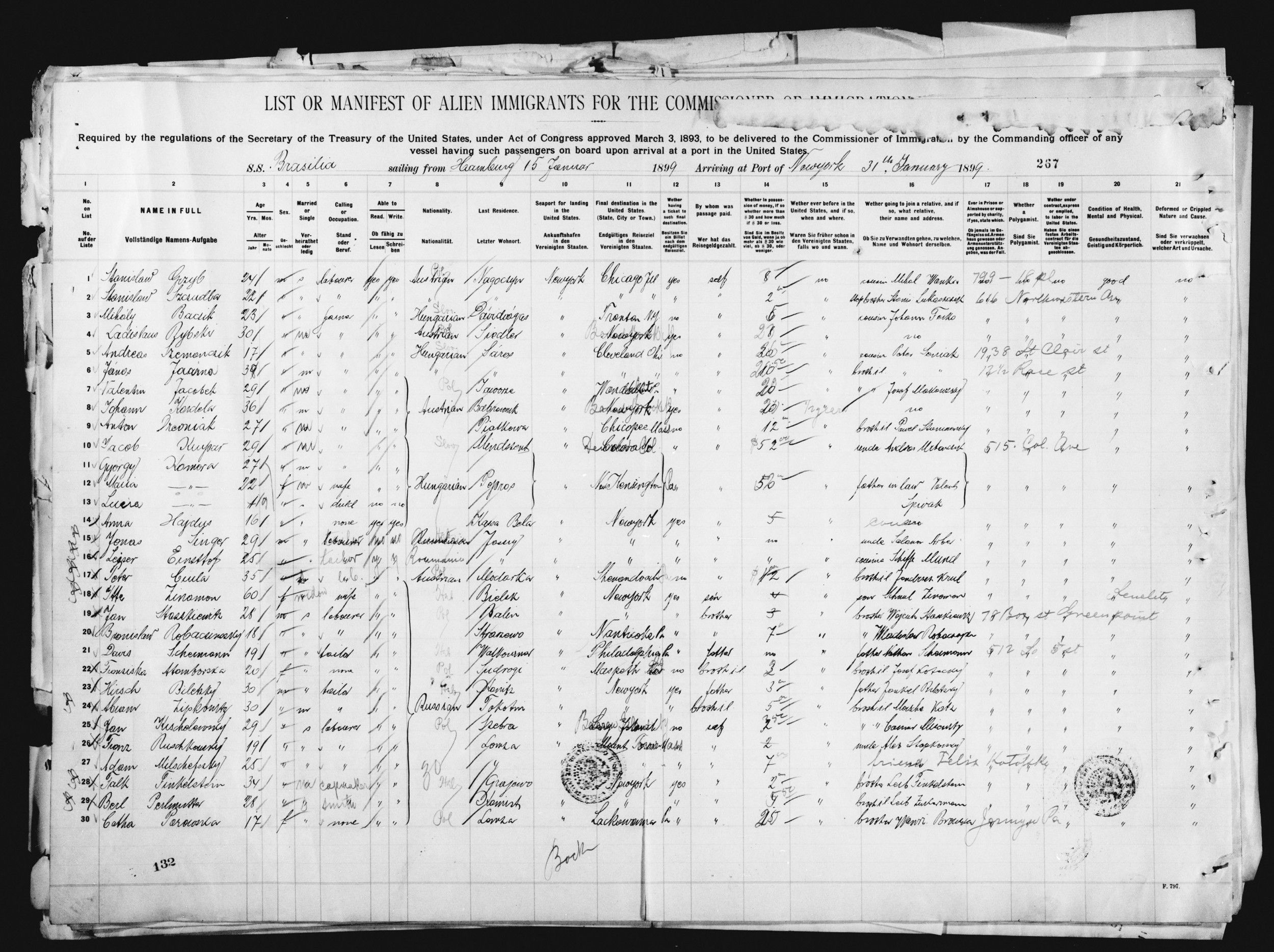
Document
Flyers Distributed by Silver Bow Trades and Labor Assembly and Butte Miners' Union in Support of Chinese and Japanese Boycott
ca. 8/1898
Like many places in the American West, Montana was the site of anti-Asian discrimination at the end of the 19th century. In late 1896, several labor unions in Butte boycotted both Chinese and Japanese owned businesses and businesses employing Asian workers, blaming these laborers and businesses for poor economic conditions.
Labor unions used flyers to notify their members and the public of this boycott. Many Chinese were forced to seek work in other cities. However, several merchants fought back and filed suit in Federal court in Butte requesting an injunction to stop the boycott as well as damages from the labor unions.
In the case Hum Lay, et al.. v. Baldwin, also known as the Chinese Boycott case, the court ruled in favor of the Chinese plaintiffs, a ruling that ran counter to the dominant public opinion of the time.
Labor unions used flyers to notify their members and the public of this boycott. Many Chinese were forced to seek work in other cities. However, several merchants fought back and filed suit in Federal court in Butte requesting an injunction to stop the boycott as well as damages from the labor unions.
In the case Hum Lay, et al.. v. Baldwin, also known as the Chinese Boycott case, the court ruled in favor of the Chinese plaintiffs, a ruling that ran counter to the dominant public opinion of the time.
This primary source comes from the Records of District Courts of the United States.
National Archives Identifier: 298113
Full Citation: Flyers Distributed by Silver Bow Trades and Labor Assembly and Butte Miners' Union in Support of Chinese and Japanese Boycott; ca. 8/1898; Records of District Courts of the United States, . [Online Version, https://docsteach.org/documents/document/flyers-distributed-by-silver-bow-trades-and-labor-assembly-and-butte-miners-union-in-support-of-chinese-and-japanese-boycott, April 20, 2024]Flyers Distributed by Silver Bow Trades and Labor Assembly and Butte Miners' Union in Support of Chinese and Japanese Boycott
Page 1
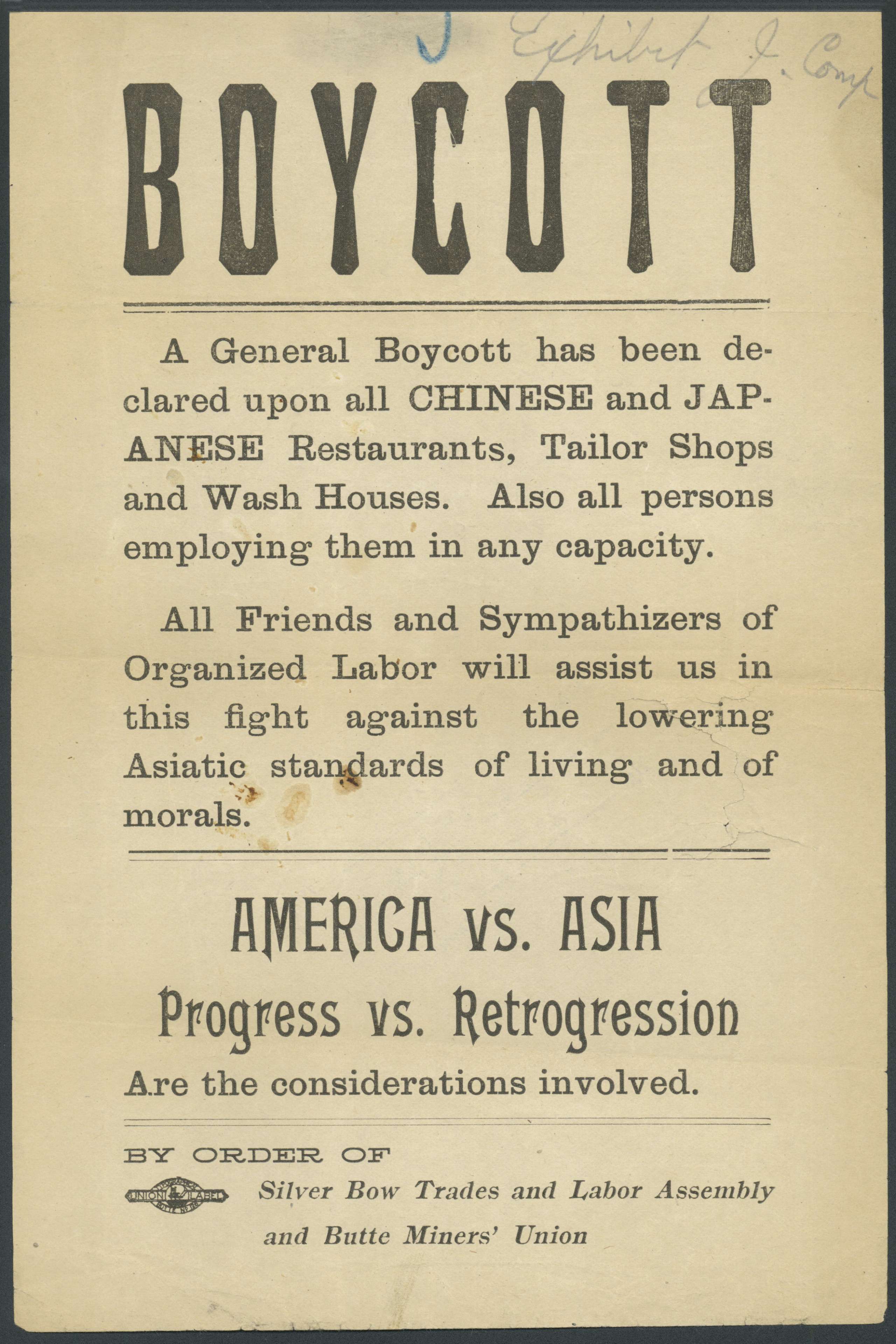
Flyers Distributed by Silver Bow Trades and Labor Assembly and Butte Miners' Union in Support of Chinese and Japanese Boycott
Page 2
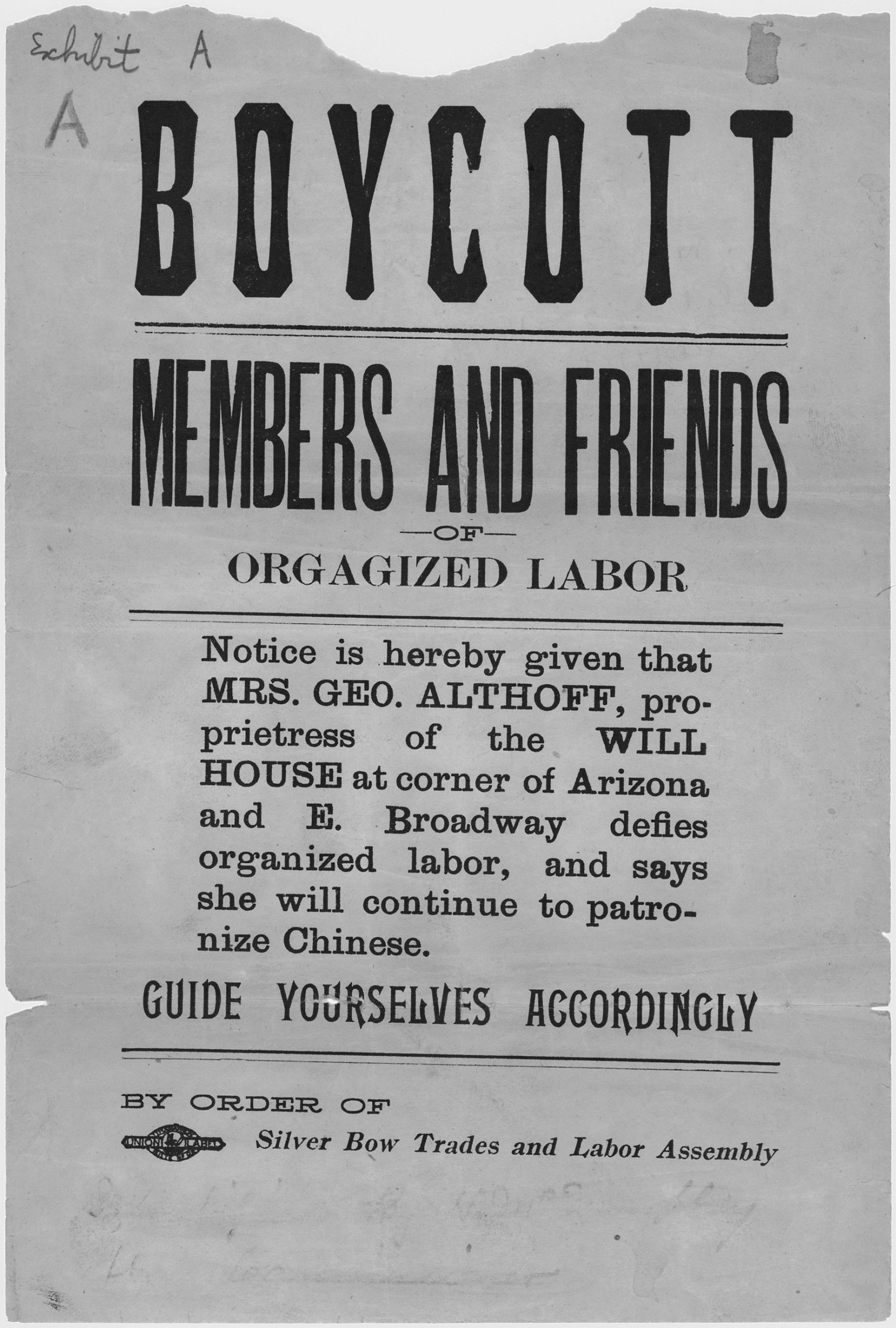
Flyers Distributed by Silver Bow Trades and Labor Assembly and Butte Miners' Union in Support of Chinese and Japanese Boycott
Page 3
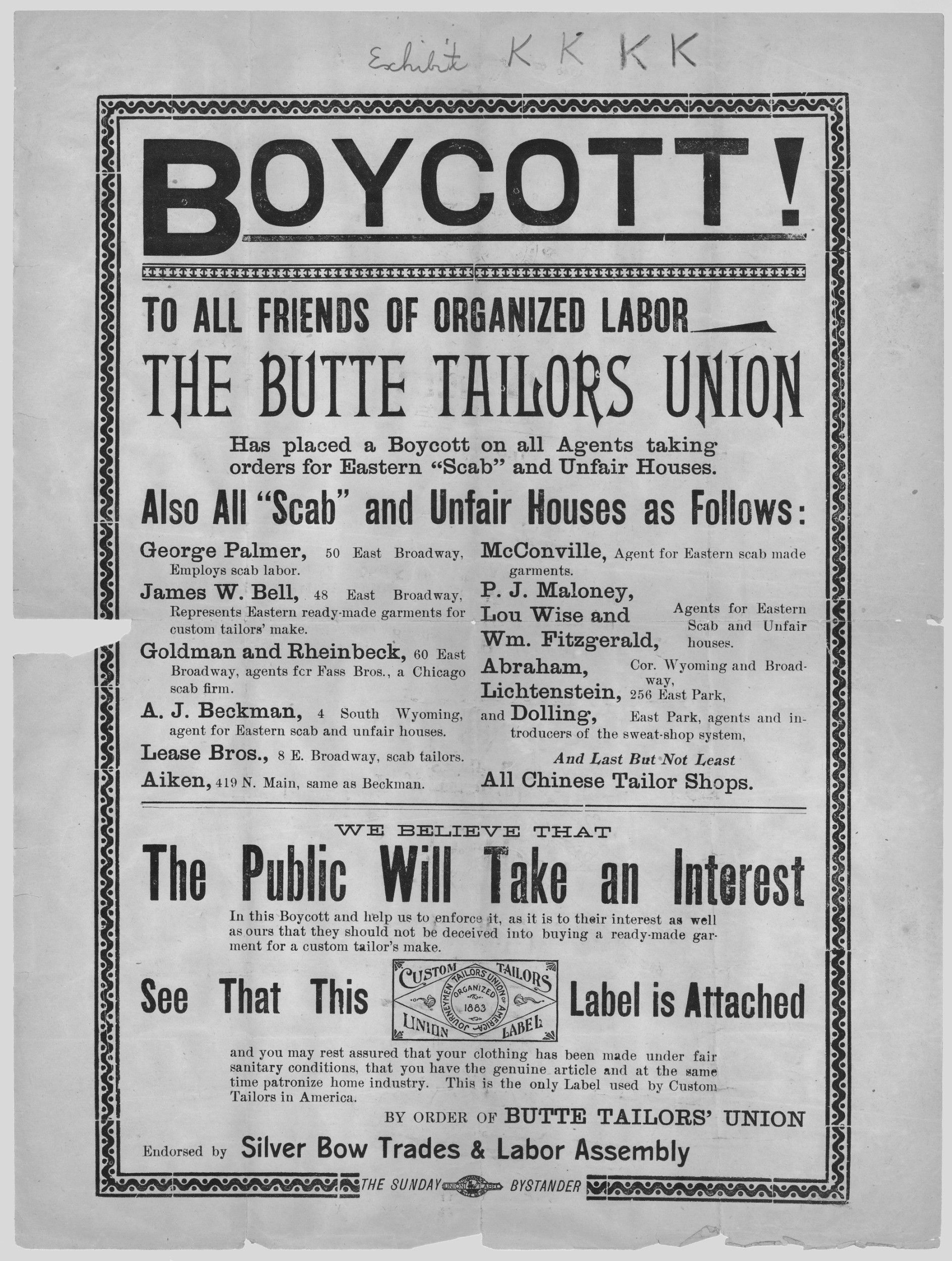
Document
Alien and Sedition Acts of 1798
1798
Passed in preparation for an anticipated war with France, the Alien and Sedition Acts tightened restrictions on foreign-born Americans and limited speech critical of the government.
In 1798, the United States stood on the brink of war with France. The Federalist Party, which advocated for a strong central government, believed that Democratic-Republican criticism of Federalist policies was disloyal and feared that "aliens," or non-citizens, living in the United States would sympathize with the French during a war.
As a result, a Federalist-controlled Congress passed four laws, known collectively as the Alien and Sedition Acts. These laws raised the residency requirements for citizenship from 5 to 14 years, authorized the president to deport "aliens," and permitted their arrest, imprisonment, and deportation during wartime. The Sedition Act made it a crime for American citizens to "print, utter, or publish...any false, scandalous, and malicious writing" about the government.
The laws were directed against Democratic-Republicans, the party typically favored by new citizens. The only journalists prosecuted under the Sedition Act were editors of Democratic-Republican newspapers.
Sedition Act trials, along with the Senate's use of its contempt powers to suppress dissent, set off a firestorm of criticism against the Federalists and contributed to their defeat in the election of 1800, after which the acts were repealed or allowed to expire. The controversies surrounding them, however, provided for some of the first tests of the limits of freedom of speech and press.
In 1798, the United States stood on the brink of war with France. The Federalist Party, which advocated for a strong central government, believed that Democratic-Republican criticism of Federalist policies was disloyal and feared that "aliens," or non-citizens, living in the United States would sympathize with the French during a war.
As a result, a Federalist-controlled Congress passed four laws, known collectively as the Alien and Sedition Acts. These laws raised the residency requirements for citizenship from 5 to 14 years, authorized the president to deport "aliens," and permitted their arrest, imprisonment, and deportation during wartime. The Sedition Act made it a crime for American citizens to "print, utter, or publish...any false, scandalous, and malicious writing" about the government.
The laws were directed against Democratic-Republicans, the party typically favored by new citizens. The only journalists prosecuted under the Sedition Act were editors of Democratic-Republican newspapers.
Sedition Act trials, along with the Senate's use of its contempt powers to suppress dissent, set off a firestorm of criticism against the Federalists and contributed to their defeat in the election of 1800, after which the acts were repealed or allowed to expire. The controversies surrounding them, however, provided for some of the first tests of the limits of freedom of speech and press.
Transcript
FIFTH CONGRESS OF THE UNITED STATES:At the Second Session,
Begun and help at the city of Philadelphia, in the state of Pennsylvania, on Monday, the thirteenth of November, one thousand seven hundred and ninety-seven.
An Act Concerning Aliens.
SECTION 1. Be it enacted by the Senate and the House of Representatives of the United States of America in Congress assembled, That it shall be lawful for the President of the United States at any time during the continuance of this act, to order all such aliens as he shall judge dangerous to the peace and safety of the United States, or shall have reasonable grounds to suspect are concerned in any treasonable or secret machinations against the government thereof, to depart out of the territory of the United Slates, within such time as shall be expressed in such order, which order shall be served on such alien by delivering him a copy thereof, or leaving the same at his usual abode, and returned to the office of the Secretary of State, by the marshal or other person to whom the same shall be directed. And in case any alien, so ordered to depart, shall be found at large within the United States after the time limited in such order for his departure, and not having obtained a license from the President to reside therein, or having obtained such license shall not have conformed thereto, every such alien shall, on conviction thereof, be imprisoned for a term not exceeding three years, and shall never after be admitted to become a citizen of the United States. Provided always, and be it further enacted, that if any alien so ordered to depart shall prove to the satisfaction of the President, by evidence to be taken before such person or persons as the President shall direct, who are for that purpose hereby authorized to administer oaths, that no injury or danger to the United Slates will arise from suffering such alien to reside therein, the President may grant a license to such alien to remain within the United States for such time as he shall judge proper, and at such place as he may designate. And the President may also require of such alien to enter into a bond to the United States, in such penal sum as he may direct, with one or more sufficient sureties to the satisfaction of the per- son authorized by the President to take the same, conditioned for the good behavior of such alien during his residence in the United States, and not violating his license, which license the President may revoke, whenever he shall think proper .
SEC. 2. And be it further enacted, That it shall be lawful for the President of the United States, whenever he may deem it necessary (for the public safety, to order to be removed out of the territory thereof, any alien who mayor shall be in prison in pursuance of this act; and to cause to be arrested and sent out of the United States such of those aliens as shall have been ordered to depart therefrom and shall not have obtained a license as aforesaid, in all cases where, in the opinion of the President, the public safety requires a speedy removal. And if any alien so removed or sent out of the United Slates by the President shall voluntarily return thereto, unless by permission of the President of the United States, such alien on conviction thereof, shall be imprisoned so long as, in the opinion of the President, the public safety may require.
SEC. 3. And be it further enacted, That every master or commander of any ship or vessel which shall come into any port of the United States after the first day of July next, shall immediately on his arrival make report in writing to the collector or other chief officer of the customs of such port, of all aliens, if any, on board his vessel, specifying their names, age, the place of nativity, the country from which they shall have come, the nation to which they belong and owe allegiance, their occupation and a description of their persons, as far as he shall be informed thereof, and on failure, every such master and commander shall forfeit and pay three hundred dollars, for the payment whereof on default of such master or commander, such vessel shall also be holden, and may by such collector or other officer of the customs be detained. And it shall be the duty of such collector or other officer of the customs, forthwith to transmit to the office of the department of state true copies of all such returns.
SEC. 4. And be it further enacted, That the circuit and district courts of the United States, shall respectively have cognizance of all crimes and offences against this act. And all marshals and other officers of the United States are required to execute all precepts and orders of the President of the United States issued in pursuance or by virtue of this act.
SEC. 5. And be it further enacted, That it shall be lawful for any alien who may be ordered to be removed from the United States, by virtue of this act, to take with him such part of his goods, chattels, or other property, as he may find convenient; and all property left in the United States by any alien, who may be removed, as aforesaid, shall be, and re- main subject to his order and disposal, in the same manner as if this act had not been passed.
SEC. 6. And be it further enacted, That this act shall continue and be in force for and during the term of two years from the passing thereof.
Jonathan Dayton, Speaker of the House of Representatives.
TH. Jefferson, Vice President of the United States and President of the Sentate.
I Certify that this Act did originate in the Sentate.
Attest, Sam. A. Otis, Secretary
APPROVED, June 25, 1798.
John Adams
President of the United States.
FIFTH CONGRESS OF THE UNITED STATES:
At the Second Session,
Begun and help at the city of Philadelphia, in the state of Pennsylvania, on Monday, the thirteenth of November, one thousand seven hundred and ninety-seven.
An Act in Addition to the Act, Entitled "An Act for the Punishment of Certain Crimes Against the United States."
SECTION 1. Be it enacted by the Senate and House of Representatives of the United States of America, in Congress assembled, That if any persons shall unlawfully combine or conspire together, with intent to oppose any measure or measures of the government of the United States, which are or shall be directed by proper authority, or to impede the operation of any law of the United States, or to intimidate or prevent any person holding a place or office in or under the government of the United States, from undertaking, performing or executing his trust or duty, and if any person or persons, with intent as aforesaid, shall counsel, advise or attempt to procure any insurrection, riot, unlawful assembly, or combination, whether such conspiracy, threatening, counsel, advice, or attempt shall have the proposed effect or not, he or they shall be deemed guilty of a high misdemeanor, and on conviction, before any court of the United States having jurisdiction thereof, shall be punished by a fine not exceeding five thousand dollars, and by imprisonment during a term not less than six months nor exceeding five years; and further, at the discretion of the court may be holden to find sureties for his good behaviour in such sum, and for such time, as the said court may direct.
SEC. 2. And be it farther enacted, That if any person shall write, print, utter or publish, or shall cause or procure to be written, printed, uttered or published, or shall knowingly and willingly assist or aid in writing, printing, uttering or publishing any false, scandalous and malicious writing or writings against the government of the United States, or either house of the Congress of the United States, or the President of the United States, with intent to defame the said government, or either house of the said Congress, or the said President, or to bring them, or either of them, into contempt or disrepute; or to excite against them, or either or any of them, the hatred of the good people of the United States, or to stir up sedition within the United States, or to excite any unlawful combinations therein, for opposing or resisting any law of the United States, or any act of the President of the United States, done in pursuance of any such law, or of the powers in him vested by the constitution of the United States, or to resist, oppose, or defeat any such law or act, or to aid, encourage or abet any hostile designs of any foreign nation against United States, their people or government, then such person, being thereof convicted before any court of the United States having jurisdiction thereof, shall be punished by a fine not exceeding two thousand dollars, and by imprisonment not exceeding two years.
SEC. 3. And be it further enacted and declared, That if any person shall be prosecuted under this act, for the writing or publishing any libel aforesaid, it shall be lawful for the defendant, upon the trial of the cause, to give in evidence in his defence, the truth of the matter contained in publication charged as a libel. And the jury who shall try the cause, shall have a right to determine the law and the fact, under the direction of the court, as in other cases.
SEC. 4. And be it further enacted, That this act shall continue and be in force until the third day of March, one thousand eight hundred and one, and no longer: Provided, that the expiration of the act shall not prevent or defeat a prosecution and punishment of any offence against the law, during the time it shall be in force.
Jonathan Dayton, Speaker of the House of Representatives.
Theodore Sedgwick, President of the Sentate pro tempore.
I Certify that this Act did originate in the Sentate.
Attest, Sam. A. Otis, Secretary
APPROVED, July 14, 1798
John Adams
President of the United States.
This primary source comes from the General Records of the United States Government.
National Archives Identifier: 5641586
Full Citation: Alien and Sedition Acts of 1798; 1798; Enrolled Acts and Resolutions of Congress, 1789 - 2011; General Records of the United States Government, ; National Archives Building, Washington, DC. [Online Version, https://docsteach.org/documents/document/alien-sedition-acts, April 20, 2024]Alien and Sedition Acts of 1798
Page 1
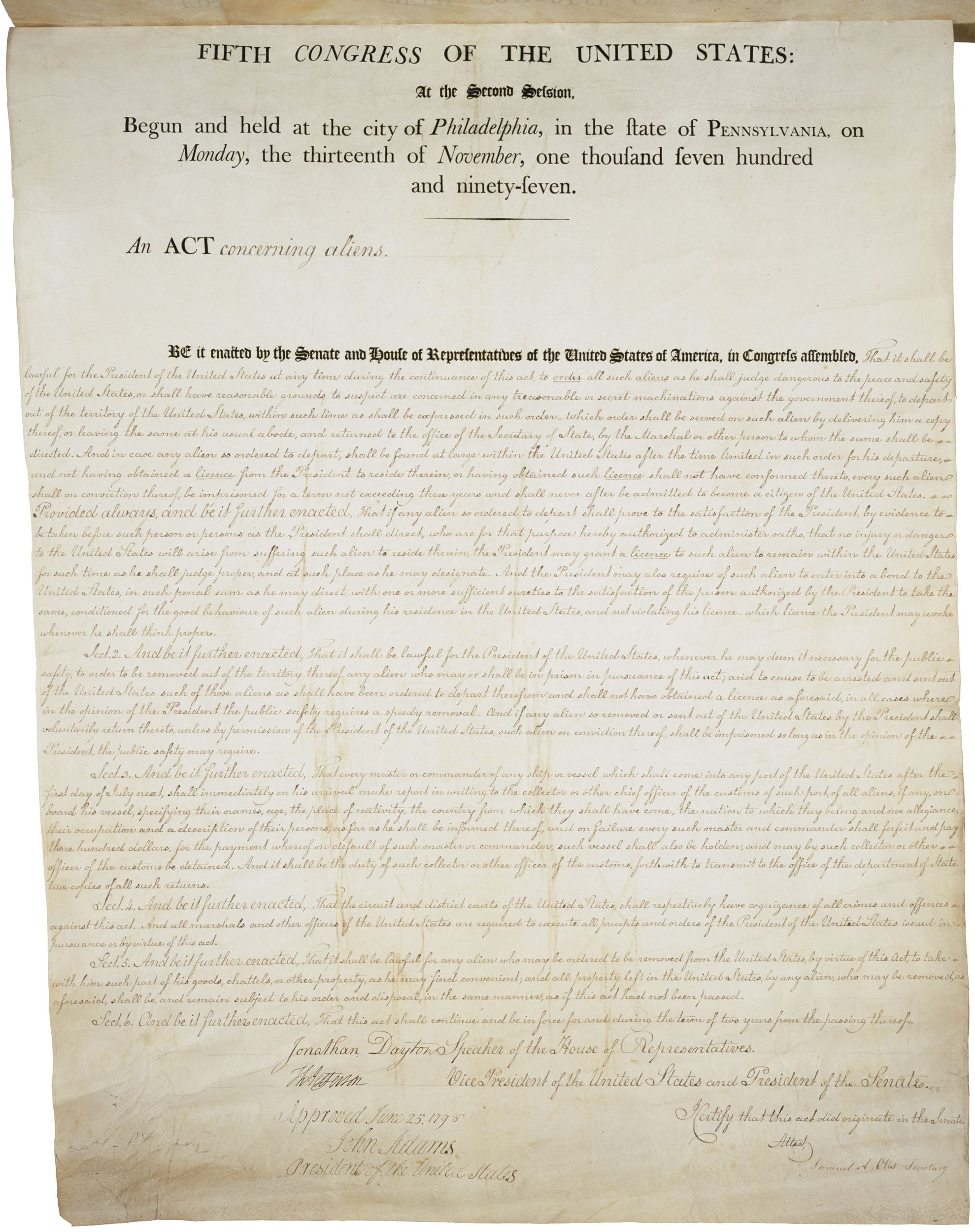
Alien and Sedition Acts of 1798
Page 2
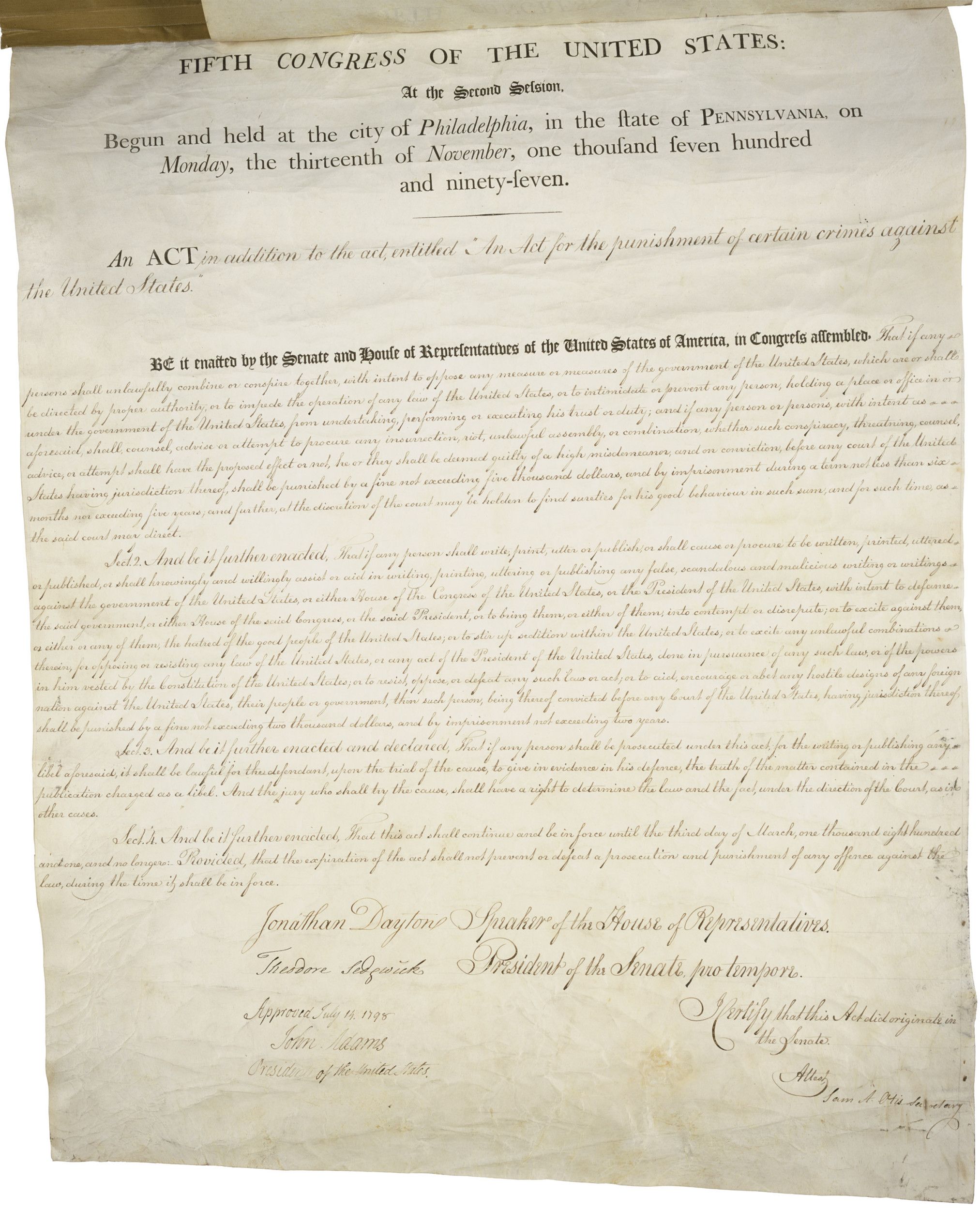
Document
Texas of North America
ca. 1909
This primary source comes from the Records of the Immigration and Naturalization Service.
National Archives Identifier: 7459465
Full Citation: Texas of North America; ca. 1909; Records of the Immigration and Naturalization Service, . [Online Version, https://docsteach.org/documents/document/texas-of-north-america, April 20, 2024]Texas of North America
Page 1
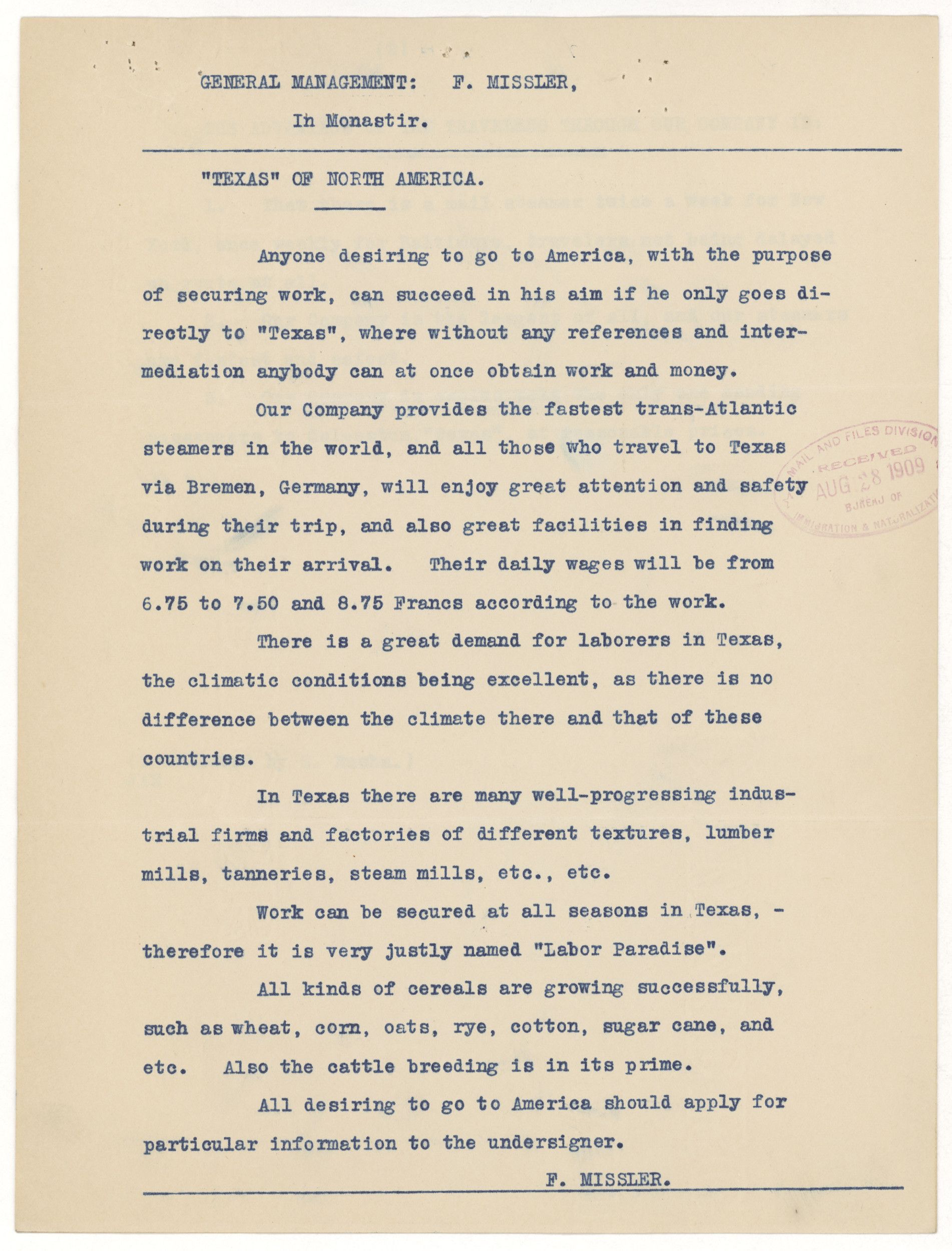
Texas of North America
Page 2
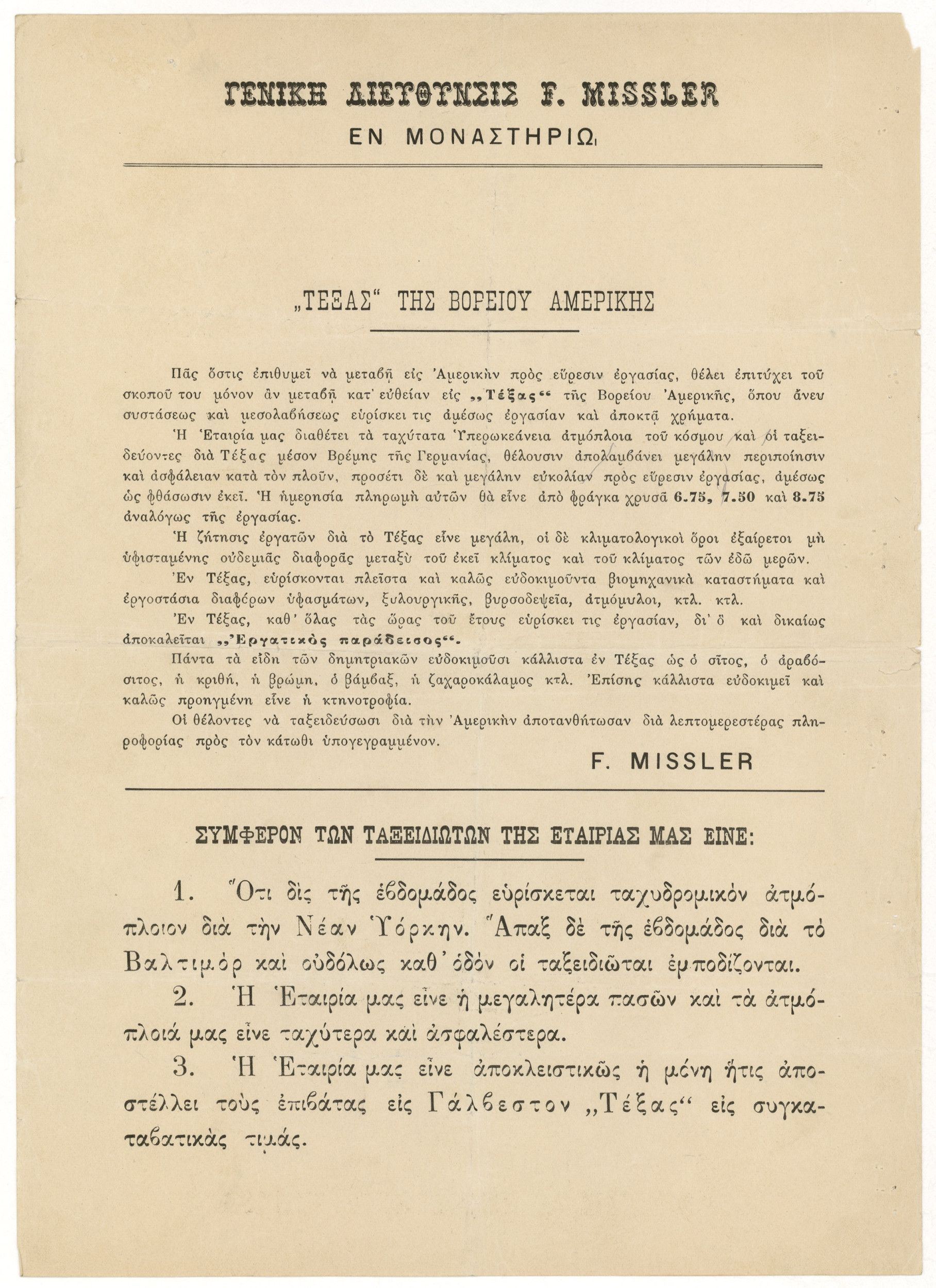
Document
A Bill to Establish an Uniform Rule of Naturalization, and Enable Aliens to Hold Lands under Certain Conditions
3/4/1790
H.R. 40, a Bill to Establish an Uniform Rule of Naturalization and Enable Aliens to Hold Lands under Certain Conditions, was introduced in the Senate on March 4, 1790. The bill provided that “any Alien being a free white person” who had resided within the United States for two years could file a petition for naturalization in any common law court located in a state in which they had resided for at least one year. After “making proof to the satisfaction of such Court that he is a person of good character, and taking the oath or affirmation prescribed by law to support the Constitution of the United States,” such person would become a citizen. It also provided citizenship for children of U.S. citizens who were born abroad.
The Naturalization Act of 1790 was signed into law on March 26, 1790.
The Naturalization Act of 1790 was signed into law on March 26, 1790.
This primary source comes from the Records of the U.S. Senate.
National Archives Identifier: 7452136
Full Citation: A Bill to Establish an Uniform Rule of Naturalization, and Enable Aliens to Hold Lands under Certain Conditions; 3/4/1790; (SEN1A-C1); Bills and Resolutions Originating in the House and Considered in the Senate, 1789 - 2002; Records of the U.S. Senate, ; National Archives Building,Washington, DC. [Online Version, https://docsteach.org/documents/document/naturalization-act-of-1790, April 20, 2024]A Bill to Establish an Uniform Rule of Naturalization, and Enable Aliens to Hold Lands under Certain Conditions
Page 1
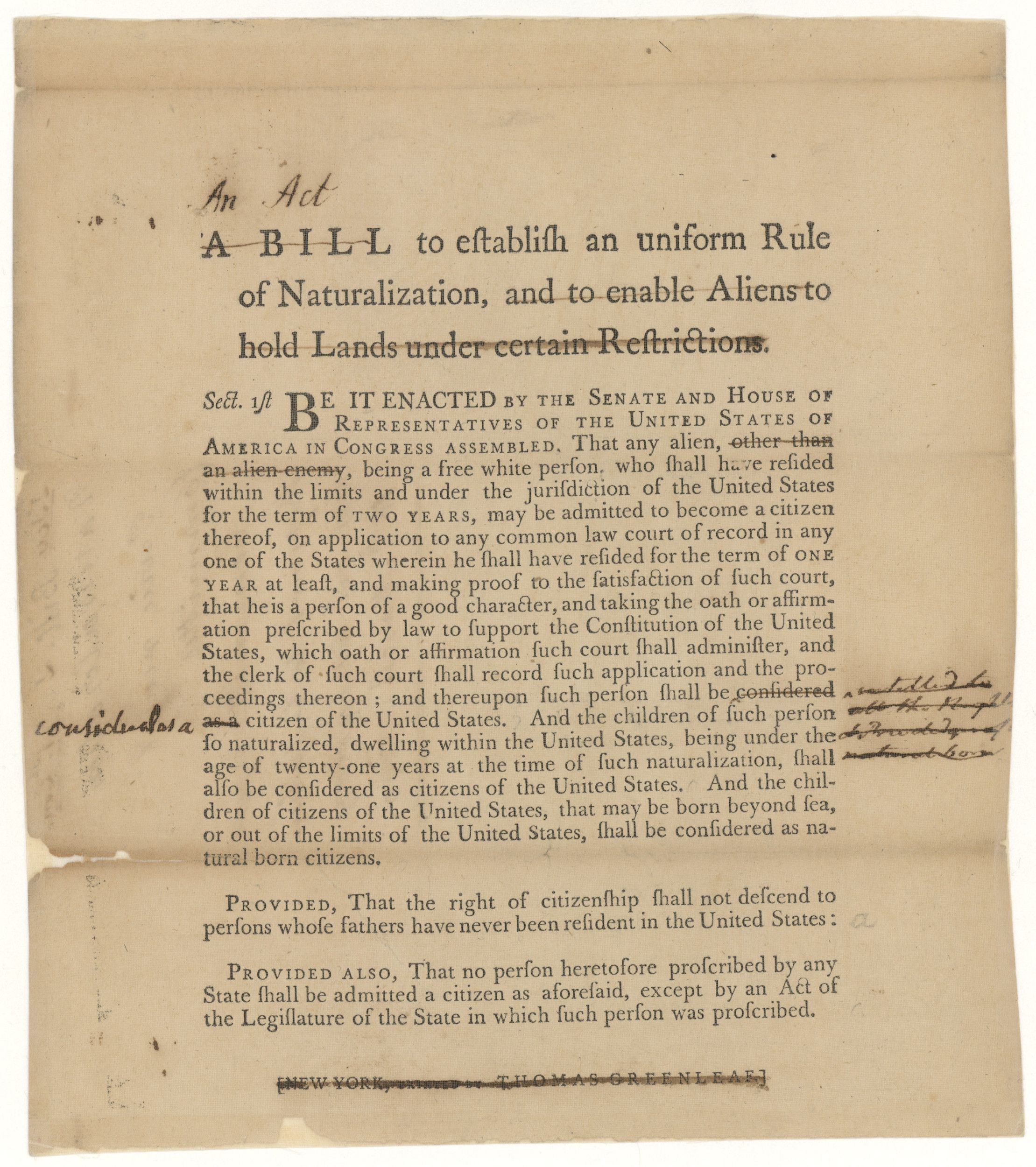
A Bill to Establish an Uniform Rule of Naturalization, and Enable Aliens to Hold Lands under Certain Conditions
Page 2
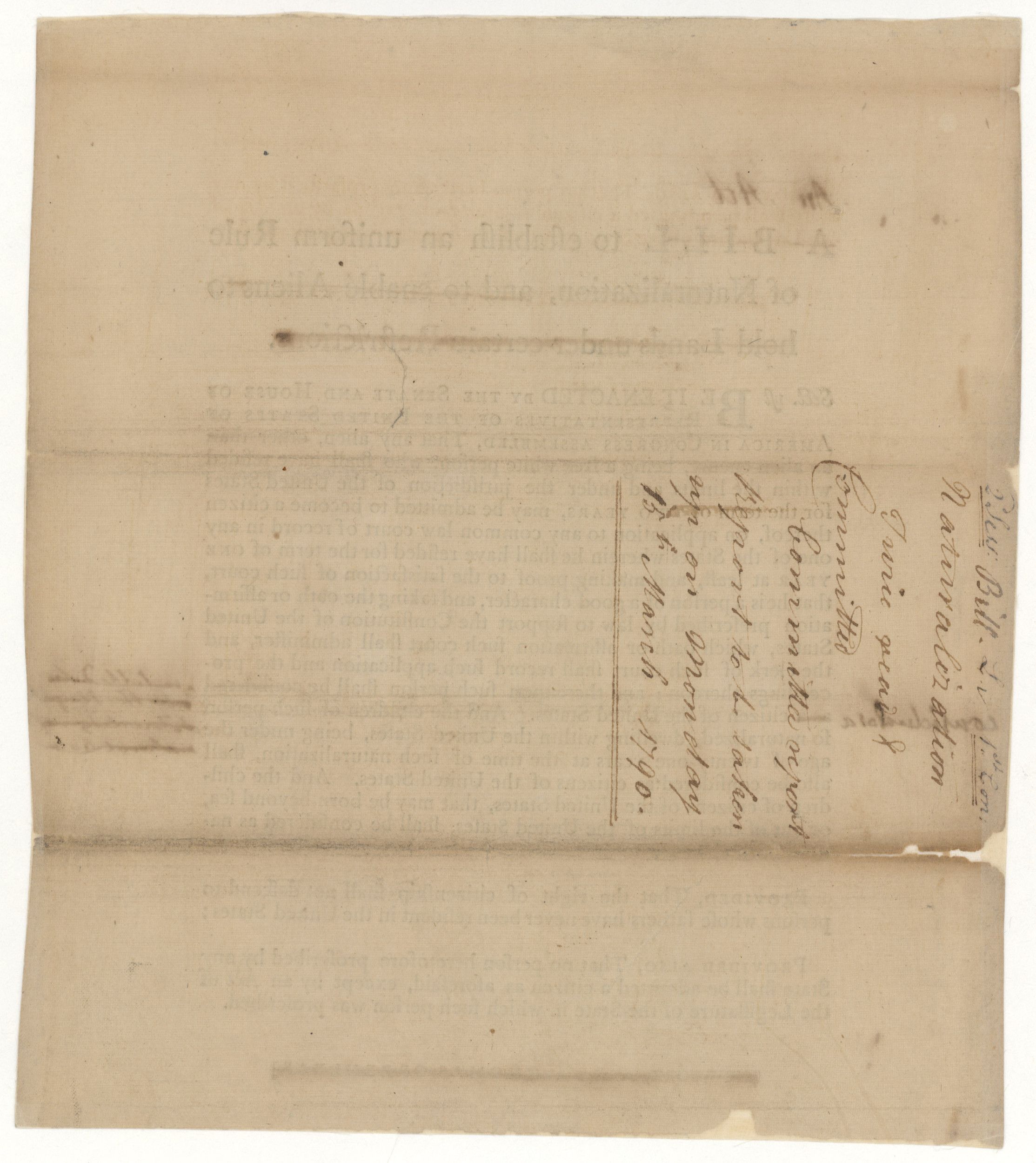
Document
Incident Memorandum Regarding Cuban Refugees, Southern Florida
4/24/1980
This primary source comes from the Records of the U.S. Coast Guard.
National Archives Identifier: 7455545
Full Citation: Incident Memorandum Regarding Cuban Refugees, Southern Florida; 4/24/1980; Records of the U.S. Coast Guard, . [Online Version, https://docsteach.org/documents/document/incident-memorandum-regarding-cuban-refugees-southern-florida, April 20, 2024]Incident Memorandum Regarding Cuban Refugees, Southern Florida
Page 1
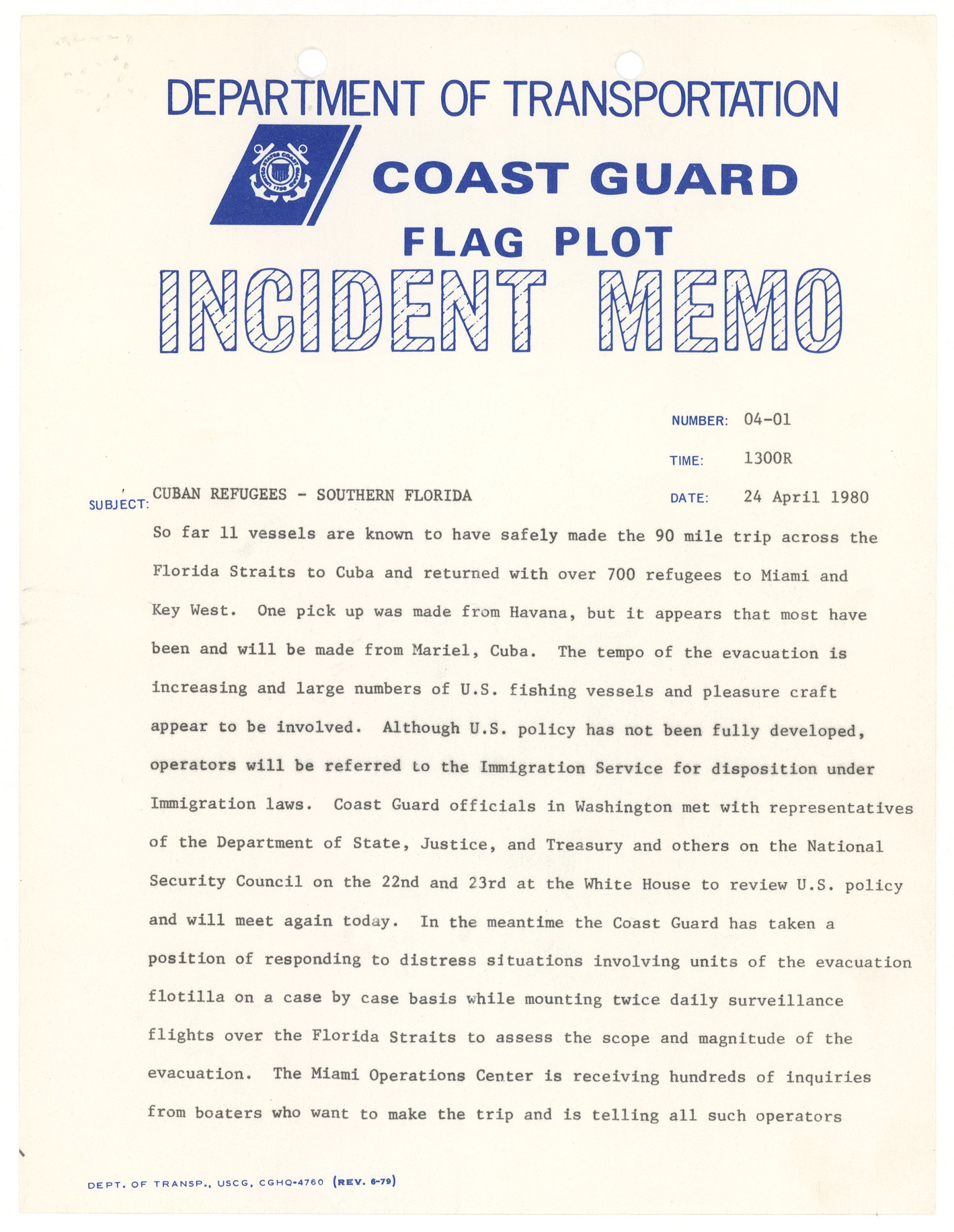
Incident Memorandum Regarding Cuban Refugees, Southern Florida
Page 2
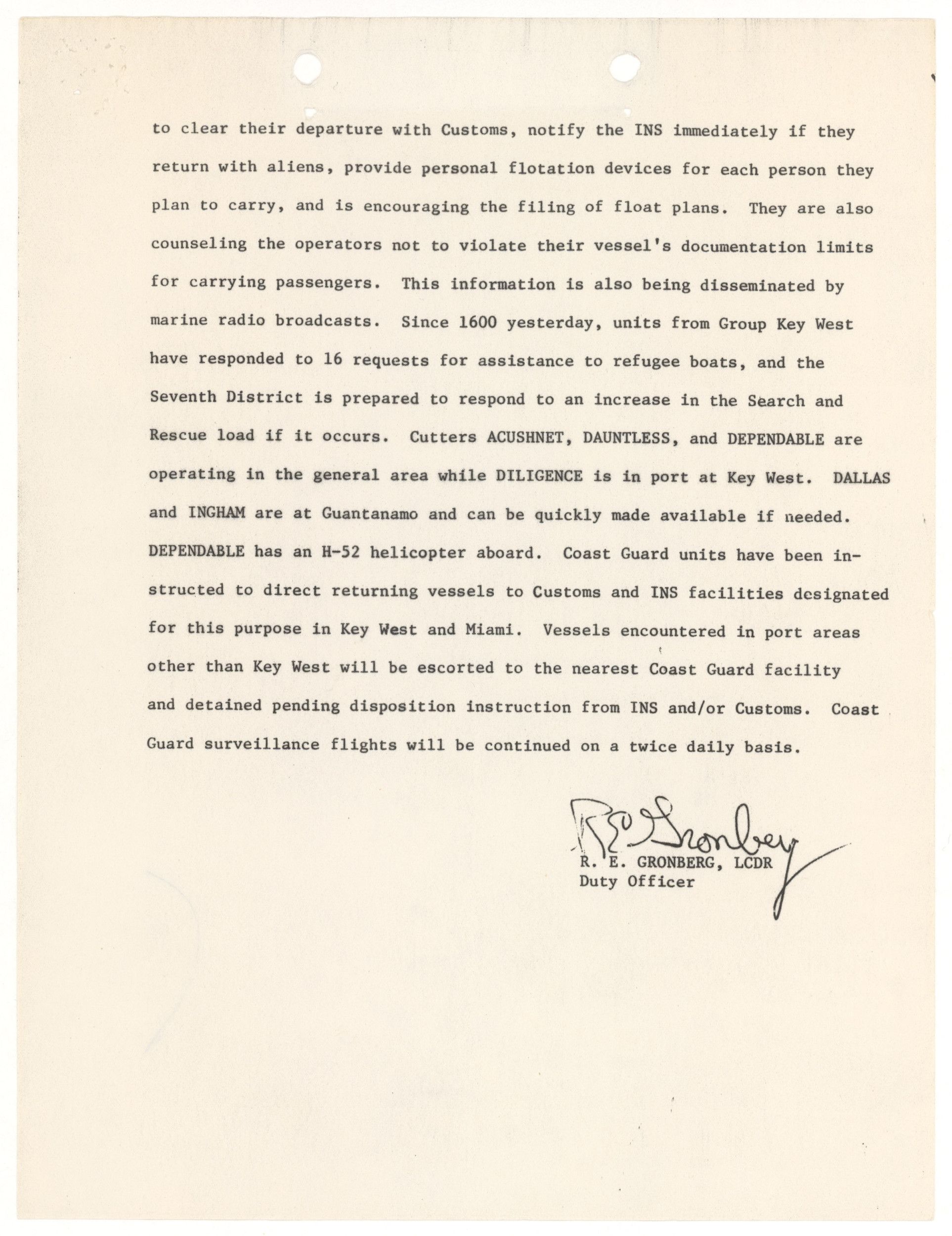
Document
Foreign-Born Friends who are Applicants for American Citizenship
1922
This primary source comes from the Publications of the U.S. Government.
National Archives Identifier: 7452511
Full Citation: Foreign-Born Friends who are Applicants for American Citizenship; 1922; Publications of the U.S. Government, . [Online Version, https://docsteach.org/documents/document/foreignborn-friends-who-are-applicants-for-american-citizenship, April 20, 2024]Foreign-Born Friends who are Applicants for American Citizenship
Page 1
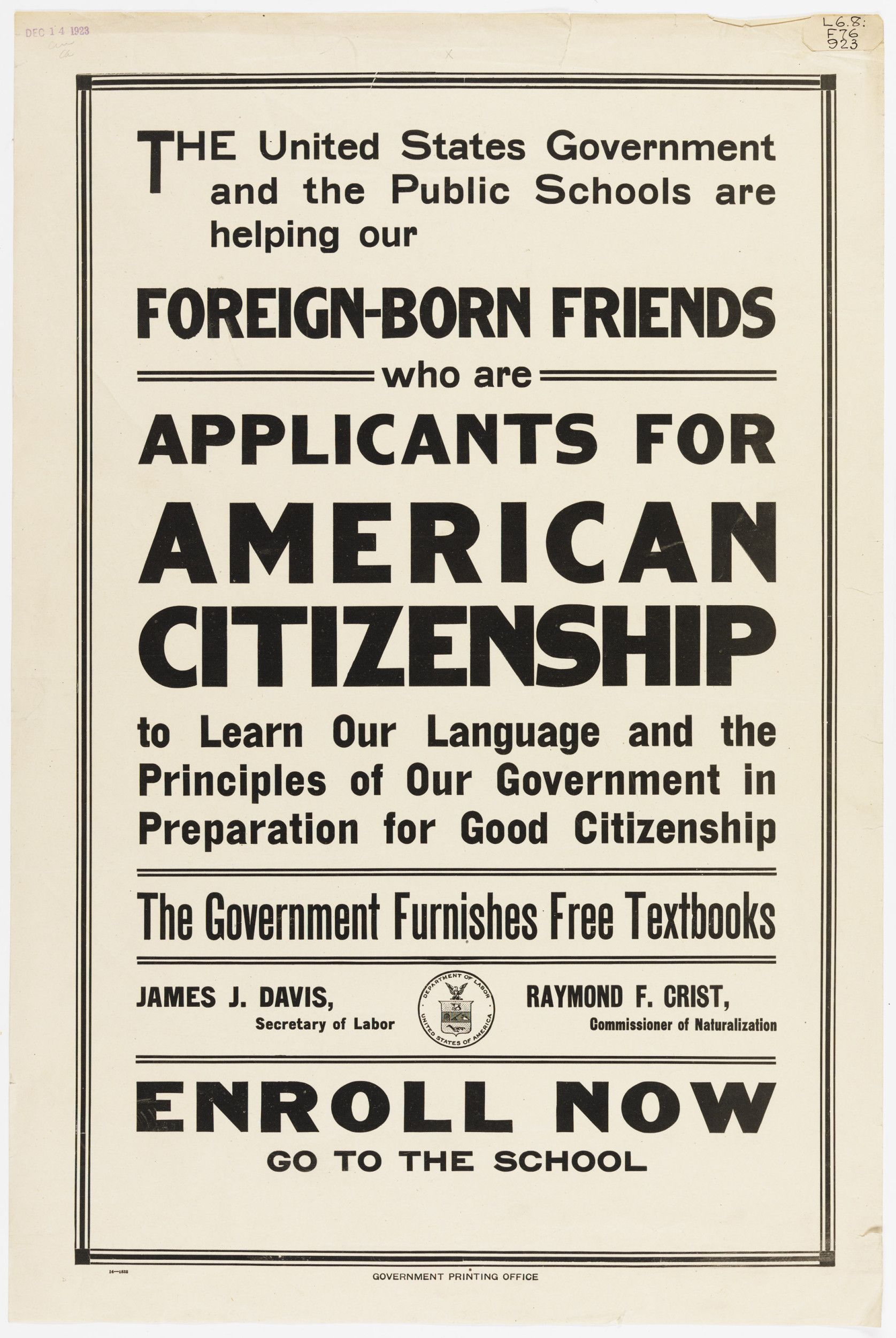
Document
Letter from German Hospital to Commissioner of Immigration, Angel Island Station, regarding enemy alien Ernst Hamann
10/12/1917
This primary source comes from the Records of the Immigration and Naturalization Service.
National Archives Identifier: 296434
Full Citation: Letter from German Hospital to Commissioner of Immigration, Angel Island Station, regarding enemy alien Ernst Hamann; 10/12/1917; Records of the Immigration and Naturalization Service, . [Online Version, https://docsteach.org/documents/document/letter-from-german-hospital-to-commissioner-of-immigration-angel-island-station-regarding-enemy-alien-ernst-hamann, April 20, 2024]Letter from German Hospital to Commissioner of Immigration, Angel Island Station, regarding enemy alien Ernst Hamann
Page 1
